#Napoleons' compassion for the enemy
Explore tagged Tumblr posts
Text
Reflection Post on Marie-Thérèse

I am not as well-versed in the subject of Marie-Thérèse of France as I am in other topics, as I have only encountered a few serious historians on the matter. My study of her has mainly been through the lens of André Castelot and Waresquiel (although I never had the chance to finish Hélène Becquet’s biography of Marie-Thérèse, having unfortunately lost the book). Furthermore, at some point, I will talk more about historical events than about Marie-Thérèse herself.
The more I read about her, the more I find myself torn between two feelings: compassion for whatshe went through as a child and a sense of contempt for her ultra-royalist views. She didn’t listen to her uncle, Louis XVIII, who, on the whole, was the wisest in the family, even though she remained loyal to him all her life. Instead, she leaned toward the political views of her other uncle, Charles X (who was a fool during his reign, trying to turn back French ideals without learning from the failures of Louis XVI). Some have claimed that, because Marie-Thérèse had a difficult character that her mother, MarieAntoinette, tried to correct, her flaws only worsened after she endured her trials. Personally, I don’t believe this. Let’s not forget that when she threw tantrums as a child, she was probably just testing her limits, like any other child (although I have no doubt that her parents and aunt taught her that absolute monarchy was the best system). In short, she witnessed the execution of her parents and her aunt (though let’s be honest, Louis XVI was solely responsible for his own demise, betraying the nation in his attempt to restore absolute monarchy. He accepted war, knowing that the soldiers had little chance of survival, allowed his wife to correspond with the enemy despite the little she knew, and, at the very least, we are dealing with a case of massive involuntary manslaughter. Even in the 21st century, a leader could be condemned to death for what Louis XVI did). Furthermore, as much as Marie-Antoinette was made a scapegoat for many of the regime’s ills, and Elisabeth too, I find it hard to sympathize with them, although I was against theirs executions with so little evidence. Regardless of what can be reproached to them, nothing could have been worse than what happened. She saw her brother forcibly separated from her, her mother, and her aunt (and on this point, I sympathize—there should never have been such a forced separation, regardless of how guilty her mother and aunt were), and he died not long after. Therefore, I believe that Marie-Thérèse of France, no matter how right the revolutionary government may have been and how wrong her family’s actions were, had the right to bear no grudge against them, especially since she was the only one in her family—along with her brother— who wasn’t guilty. She suffered simply because she was born into the wrong family, which loved her dearly, despite everything. In fact, I don’t fault her for having ultra-royalist views, because, first of all, everyone has the right to hold different political opinions, and second, as I’ve mentioned, she suffered from a young age, in a time when therapists didn’t exist. So imagine the damage… It is especially when she returned to France that I feel compelled to make some criticisms.
Of course, she wasn’t at the head of the Kingdom of France and didn’t make the decisions, but let’s not forget two things: she was on track to become the next queen consort (since she married LouisAntoine de Bourbon), and she approved of ultra-royalist ideas. First, when Louis XVIII returned to the throne for the second and final time, facing Bonaparte, Marie-Thérèse naturally wanted to erase all traces of Napoleon. This seems understandable, as a new regime was being established, and it needed to be clear that Bonaparte’s reign was over. Here’s an excerpt from André Castelot’s book: "All the walls of the palace, the furniture, the hardware, the lamps, are covered in imperial crowns and the cursed 'N'. Eagles soar on the ceiling, bees flutter on the draperies, and the carpets are covered with violets. Efforts were made with fervor to hunt down the bees, to turn the eagles into swans, and to change the 'N' into two 'L's back to back. But the task was considerable! The Count of Artois found that nothing was progressing. Urged by Madame, he came to complain bitterly to his brother, who shrugged. Had he not promised to pardon even the symbolic violets of the Empire?"
Now, here are two things that struck me. At a time when the situation in France was catastrophic, with foreign powers demanding terrifying compensation, not to mention the issues of the White Terror and the loss of territories, she advised (although Artois would have done this with or without her) focusing on real estate, rather than advising him to deal with much more urgent matters. Moreover, I feel like these works cost quite a bit of money, particularly in silverware. Again, this is in poor taste when considering the state of France’s finances.
She would quickly oppose, as I mentioned earlier, the fact that Louis XVIII was a bit more flexible than they were, although she should have listened to him. Nevertheless, it’s important to note that she deserves credit for remaining loyal to him.
This ultra-royalism that Marie-Thérèse supported would do a lot of harm to France. To begin with, it veered into mysticism, with some ridiculous aspects, such as the Thomas Martin case. This peasant, convinced that an archangel had sent him to the king to ask for a counter-revolutionary crusade, was even received by Louis XVIII. While the right (some insincerely) claimed that they were right, the left considered him a victim of hallucinations. The ultras, faced with what they saw as revolutionary individualism, advocated for a society based on divine right, where man has no rights but only duties toward God. There was a rejection of the concepts of liberty and equality, claiming that man would be happier accepting the place God had for him, rather than attempting to transform the world.
It goes without saying why this idea was a catastrophe.
Finally, the assassination of the Duke of Berry, made a martyr (who had been a worldly and libertine figure previously looked down upon by the ultras), ensured that the ultras succeeded in pushing out the liberal minister Decazes, leading to an even harsher regime. As a result, figures like Lafayette found themselves at the head of movements like the Carbonari, composed of Bonapartist nostalgics, republicans, and royalists loyal to Decazes. In 1820, the “French Bazaar” plot, aimed at a coup, was discovered and suppressed with moderation. Other uprisings were planned, particularly in the West. In 1822, there was the affair of the four sergeants of La Rochelle: these noncommissioned officers, accused of conspiring against the regime, were arrested and sentenced to death despite the lack of concrete acts (they had only had discussions about their opposition). Their execution turned them into martyrs for the liberal-royalist opposition, republicans, and Bonapartists.
Once again, Marie-Thérèse is clearly not the person responsible for this fiasco, and I don’t believe she wanted the death of these four sergeants. It wasn’t her who led France, and she wasn’t the minister. However, the fact that she supported this ultra-royalism, despite seeing the damage it was causing, shows that she didn’t realize ( or didn’t want to see) the the dangers of ultra politics.
It seems that she approved of the coronation ceremony of Charles X in Reims, which cost a vast sum of money—an imprudent reminder of the time of absolute monarchy and a justified anger from Parisians. There was even a law that Charles X enacted which pleased the ultras: the death penalty for sacrilege, which caused an outcry. Although this law was not adopted, the dangers of such a measure were clear. Another law was the one on the billion, compensating émigrés who had lost their properties sold as national goods during the revolution. Again, not only was this not a priority for rebuilding the country, but it also showed a condemnation of the revolution. Furthermore, this decision ultimately angered even the most meticulous ultras who simply wanted the restitution of their properties. The amount paid didn’t reach the billion, which might have frustrated the recipients, but it was still significant enough to further irritate the opposition.
Honestly, even some of the successes achieved by the minister Villele (who, although more reactionary than Decazes and detesting liberalism, didn’t want to strengthen the position of the ultras) under Charles X don’t make me want to praise him, especially regarding Haiti. Charles X would have liked to, but he knew it wasn’t possible to reconquer Haiti. He would, therefore, force this new country, under the threat of war (which Haiti knew must be avoided), to pay France 150 million gold francs as compensation. It wasn’t until the 20th century that this debt was paid, showing the financial difficulties Haiti had to face. This is dishonest, because if we look at the facts, it was really France that should have compensated Haiti, given the harm they had done, especially when Bonaparte attempted to restore slavery, as you can see in this post:https://www.tumblr.com/nesiacha/758502228409614336/here-we-come-about-a-shocking-act-by-french-army?source=share .
Then, Charles X would go even further into ultra-royalism by appointing Polignac. Upon taking office, Polignac’s government, seen as ultra-royalist, sparked strong liberal opposition. Polignac, though aware of the limitations of his actions, struggled to align his policy with the Constitutional Charter, leading to conflicts with the Chamber of Deputies. In March 1830, an address passed by 221 deputies clearly manifested their opposition to the king, who responded by dissolving the Chamber and organizing new elections. However, despite dubious maneuvers to influence the results, the liberals won an even greater victory, deepening the political crisis. Meanwhile, the economic situation worsened: a banking crisis, poor harvests, and rising unemployment weakened the population, while social and generational tensions heightened.
The frustrations of students, workers, and peasants fueled a climate of unrest conducive to revolt. Faced with this growing opposition, Charles X attempted a power grab in July 1830, imposing ordinances to dissolve the Chamber, strictly control the press, and reform the electoral system to favor the aristocracy. These measures provoked an immediate reaction: the press called for resistance, workers and students rose up, and barricades multiplied in Paris.
The incompetence of the government and the absence of military reinforcements (which shows Charles X’s narrowmindedness since his best fighters were sent to Algeria,Charles having waged this war of conquest in order to distract people from real political problems ) facilitated the insurgents’ victory, and they took control of the capital on July 29. Faced with this insurrection, Charles X withdrew his ordinances and attempted a government reshuffle, but it was already too late. On July 30, his regime was condemned, paving the way for a dynastic change and the July Monarchy.
What about Marie-Thérèse? She didn’t hesitate to support the ultra-royalism advocated by Charles X, against all common sense. She let her personal grudges take precedence over the good of France and its people, to whom she was destined to be queen consort. As I said earlier, her convictions could have been forgiven if she had chosen not to get involved in politics. But the moment she decided to participate, whether directly or indirectly, since she held the position of first lady of the court, she had the responsibility not to act on her grudges and to push aside her overly reactionary ideas for the good of her country and its people. Many people suffered as much as, if not more than, she did during the French Revolution, and they decided to fulfill what they considered their duty for the good of their country.
There are even leaders in history who suffered before being crowned and later worked with people who had directly or indirectly harmed them personally.
Yet they adopted the right attitude, surely they despised them in public, but they set aside their grudges for the good of their countries, which was the essential thing to do (although, to be fair, the monarchs I have in mind didn’t face cases of regicide themselves and were horrified by it, and were called to obey the sovereignty, even though Elizabeth I did ultimately have Mary Stuart executed after much hesitation—though that’s a complex story).
Marie-Thérèse didn’t do that. Yes, she was charitable, loyal and very courageous, but that’s not enough when you see that she supported policies that wasted money for nothing. Severe, atrocious measures came from those who supported the ultra-royalism she backed, and she saw how this affected grieving families (especially with the case of the four sergeants of La Rochelle), but she was too rigid to change her attitude, disconnected from reality, and stubborn.
In the end, she and her husband, Louis XIX, could only be king and queen for 20 minutes because they were too tied to ultra-royalism, which ended up being the best thing. We can only understand the general indifference when Charles X, his son, and Marie-Thérèse left once again.
However, far from me the idea that this woman was a bloodthirsty person—that’s not true. But it would be a good idea if one day there were a historically accurate series from 1789 to 1848 (without demonizing the government of Year II or over-glorifying Bonaparte, as we see nowadays). It would be so interesting to follow Marie-Thérèse’s journey from a joyful child to a sad teenager due to all the misfortunes she endured, and then to a stubborn ultra-royalist woman. That would be fascinating.
P.S. After some hesitation, I didn’t mention how the regicides who rallied to Bonaparte were exiled and suffered from that exile, as one might argue it was a necessary repression since they supported Bonaparte, who had ousted Louis XVIII from the throne. For the same reasons, I didn’t include the story of the so-called repression of the patriots in 1816. Sources :
Hélène Becquet
André Castelot
Antoine Resche
P.S : To see the complexity of the political scale (there is a short excerpt on the Restoration period here: https://www.tumblr.com/nesiacha/758891467906465792/mini-history-on-a-short-period-concerning?source=share)
#history#france#frev#french revolution#restauration#of the bourbons#marie therese charlotte#reflexions#ultra royalism#Charles X#louis xviii
38 notes
·
View notes
Text
because I'm autistic I decided to catalogue all the flower language meanings in pommes gift to pepito and em
regrettably I'm not including sunny because there were no flowers in her gift. this is mainly for me to have an archive of it. pomme did say she looked into flower meanings for em ! if anyone has anything to add/correct please do, I tried my best to find the names of some of the modded flowers but I'm not familiar with the mods so I didn't know for sure, just guessed based off appearance
Pepito
blue amaranth (amaranthus in general) - longevity, immortality (amaranthus is derived from Greek meaning unfading)
red amaranth (also known as love-lies-bleeding) - hopeless love or intense and genuine love, deep emotion, warmth, energy
purple amaranth - unchanging affection, independence, individuality, abundance, prosperity
pink amaranth - vitality, empathy, compassion, understanding, given to show support, comfort, affection
additional info : red, pink and purple amaranth are colours that amaranth cockscomb comes in, amaranth cockscomb is most associated with red, amaranth cockscomb means affectation (pretentious manner) and foppery (excessive attention paid to clothes/appearance)
Em
cornflowers (pomme's favourite flower) - beauty, purity, grace, love, fertility, nature and its independence, bravery, loyalty, hope, anticipation, patience, elegance, delicacy, refinement, single blessedness
the cornflower has ties to France; there is a story that when Napoleon invaded Prussia Queen Louise hid her children in a field of cornflowers, making flower crowns for their heads so they would blend in. It was also worn by the french military. Cornfowers in France are a symbol of remembrance, known as the Bleuet de France.
black rose - death, mourning, tragedy, farewell to a loved one, danger, sorrow, revenge, endings, new beginnings, rebirth, eternal love. historically it was a symbol of dark magic, but also a symbol of resistance for anarchist and anti-authoritarian groups
poppies - consolation, remembrance, death, peace, loss, deep sleep, eternal rest, imagination, resurrection
peony - good luck, compassion, love, honour, happiness, wealth, elegance, beauty, bashfulness, shame
The association between peonies and bashfulness is from folklore where pesky nymphs hid in the petals of peonies. In China they symbolise rank/wealth. It is said that Empress Wu Zetian walked through the imperial gardens and became upset the flowers weren't blooming, issuing a decree for them to bloom. The next day they all bloomed apart from the peonies, which enraged her, and she ordered them burnt. The next day, however, they grew back from the ashes as red flowers, then she banished them to Luoyang Palace.
That one red and white/cream flower in the pack is my greatest enemy. it could be a red and white carnation, in which case it would mean purity, luck, love and affection, or more likely the incan lily meaning devotion, pure friendship, support, love, faithfulness, "you are beloved" condolences at a time of sorrow, or it could also be a red and white rose symbolising unity
I think the flowers at the bottom are red marigolds? I'm working under the assumption they are. Red marigolds - love, passion, marigolds - grief, despair, genuine hurt from mourning, compassion, remembrance, the beauty and warmth of the rising sun, resurrection. In Shakespeare's A Winters Tale Perdita hands flowers out saying "The marigold, that goes to bed wi'th' sun, And with him rises,weeping.”
#qsmp pomme#qsmp#qsmp pepito#qsmp empanada#q!pomme#q!pepito#q!empanada#pomme the egg#pepito the egg#empanada the egg#qsmp analysis
20 notes
·
View notes
Text
Task Force Hogan by William R Hogan
MWSA Review Pending
Author's Synopsis
At 28, Samuel Hogan was the youngest tank battalion commander during WWII. He was responsible for the lives, welfare and mission accomplishment of his 500 soldiers riding to battle on Sherman and Stuart tanks. With courage and compassion, he led his troops in some of the toughest battles of the European Theater. They were the only tank battalion in the path of both major German offensives in the West: Mortain and the Battle of the Bulge. For their actions at Mortain, the unit was awarded the Presidential Unit Citation in March 2020. As part of the mighty 3rd Armored Division, the Task Force was one of the first units into Belgium, first to cross into Germany since Napoleon, first to capture a major German city (Aachen), and participated in the longest single-day advance against enemy resistance in military history (90 miles). They are best known for their part in the Bulge, where they rode back from their advance positions in Germany to meet the enemy counteroffensive. Arriving with fuel tanks half-empty, they fought a skilled delaying action against numerically superior forces until they were surrounded by enemy infantry infiltrated through the woods. Refusing an enemy surrender ultimatum, the under-strength battalion continued to harass the Germans by calling artillery and direct fire from their hilltop redoubt at Marcouray. On Christmas Day, short of fuel, ammunition and medical supplies, they were ordered to destroy their equipment and make their way back to friendly lines on foot. This was successfully accomplished and by early January they were rearmed and participated in the elimination of "the bulge." A rip-roaring ride, this is a human story written as a nonfiction narrative, impeccably researched. Ride with Task Force Hogan!
Format(s) for review: Paper and Kindle
Review Genre: Nonfiction—History
Number of Pages: 320
Word Count: 95,000
v
0 notes
Text
War and Peace 190/198 -Leo Tolstoy
181
November seventeenth, the first day of the Battle of Krasnoye, it was already evident with the enemy running away everywhere the battle could not take place. Kutuzof rode to Dobroye, past seven thousand French prisoners, Kutuzof didnt hear the reports, looking at the prisoners with displeasure at their poor states. He addressed the Preubrazhensky regiment thanking them for their service, victory is complete, they cheered. Kutuzof then tells them they have to escort their guests out of the country then rest, the Sovereign won’t forget their labors or them. (tell that to the American Vets) “It is hard for you, but you are at home all this time, while they-see what they have come to,”-”worse than the lowest beggars. While they were strong we had no pity on them, but now we may pity them. They, too, are men. Isn’t that so, boys?”p.640 (it is official Kutuzof is the best character let’s see how he gets screwed over) The troops hardly understood his words but did feel his compassion for the enemy. Later when asked if he’d prefer to ride in a carriage Kutuzof broke into tears.
182
The misfortunes of the French army suddenly accumulated on the Beresina bridge. In Petersburg Pfuhl made a plan to snare Napoleon, Beresina, in reality, it was far less disastrous to the French than Krasnoye. The farther the French fled the more pitiable their state especially after Beresina. After Beresina, retired Grand Duke Kanstantin Pavlovitch came from Kutuzof’s army and informed him of Alexander’s disatisfaction and will arrive soon. Now Kutuzof realized his time has come, he played his part, he no longer had power. He felt his mission was fulfilled also he was ready to retire.
On December eleventh Kutuzof went to Vilna able to cast off military and governmental cares. On the twenty third the Soveriegn, Count Tolstoy, Prince Volkonsky, Aracheyef and the rest of his suit came to Vilna. When meeeting Kutuzof he embraced him and Kutuzof cried alone, Alexander spoke of his disatisfaction. When Kutuzof left the study Count Tolstoy gave him the St Georges cross saying he saved Europe but everyone understood the war wasn’t over except Kutuzof. He insisted a new war wouldn’t improve Russia, it was impossible to get new armies, naturally with these ideas he became a stumbling block in the coming war. Kutuzof’s staff was destroyed or transferred to the Sovereign and Kutuzof’s place will be filled. Alexander would now move the nations from east to west and establish boundaries for the glory of Russia. For Kutuzof had no notion of the balance of power after the enemy was annihilated Russia was saved. On the pinicle of glory for him there was nothing left to do for him nothing but death, so he died. (if you didn’t get that they baisically forced him into retirement)
183
Pierre felt the strain of being a prisoner after he stopped being a prisoner, he went to Orel and fell sick for three months. Gradually he believed no one would deprive him of his bed and food but for a long time in his dreams still saw himself in captivity. (so he has PTSD) He also gradually understood the news of Andrei and Helene’s deaths and the fall of France. Now he felt freedom, alone in a strange city no one wanted anything of him and he had everything he wanted, he could live, the question why no longer existed. Pierre still had his oblivious absent minded look on the outside but did listen to what was spoken to him but his mind was elsewhere. He seemed to be a good man but unhappy, now he smiled and people liked to be with him and he listened.
Catherine, who formally didn’t like him, (understatement of the century) came to Orel under obligation to take care of him found she surprisingly grew fond of him as he recollected her childhood. “Yes, he is a very, ery good man when he is under the uinfluence of people who are not bad-of people like myself.”p.646 The servants noticed he was more simple, they and the doctors would frequently visit him in his sick bed. The doctor brought a French prisoner to see Pierre and was only happy when around him, though Pierre suffered from the French he seemed to have no ill will towards them. Another change was Pierre’s sense of judgement of his estate and could now refuse those that demanded his money. Moscow cost Pierre two million, the overseer told him to refuse to honor his late wife’s debts or rebuild his estate in Moscow. But later after being told the condition of the city and Vasili’s letters Pierre decided it wasn’t right his income would be reduced by three fourths but he would settle the debt and help rebuild Moscow. (I know rebuilding a city id expensive but how much debt did that bitch rack up what was she buying)
184
It’s hard to explain after the departure of the French why the Russian people returned to Moscow. In October, despite the absence of authorities, priests, riches and houses, it was the same as it was in August the population rose exceeding that in 1812. The first to return also plundered the plundered city, each day it was pillaged more and the more difficult. The more the wealth decreased the more it was shared so increased the wealth of Moscow and restored the city. Besides the pillagers came others, some by curiosity, duty, service gradually flowed back in and order restored.
185
In February Pierre returned to Moscow, his acquaintances welcomed him and pelted him with questions but Pierre was now guarded to everyone. He heard the Rostof’s were in Kostroma and now rarely thought of Natasha on the third day learned Maria was in Moscow and he remembered Andrei’s death and went to visit her. When Pierre went to see her and didn’t recognize Natasha, he was told Andrei spoke of him in his last days. He believed he was killed and says it was good fortune that he fell in with the Rostof’s. Maria finally asks if he doesn’t recognize her companion and he didn’t believe it, when Natasha smiled doubt crossed and he remembered he loved her. He didn’t recognize her because she was so thin and pale and there was no smile in her eyes. Pierre stopped speaking feeling now in his freedom his every word and act had a critic who was dear to him. Maria told him how Andrei was in his last days and Natasha agrees it’s good fortune to meet again and told him about Yaraslavl, a tale of pain and joy, it was the first time she spoke to him.
186
They sat at the dinner table in awkwardness finally they asked if Pierre heard incredible stories about him. He lost two million in Moscow and was made richer for it, he’s going to rebuild, he and Helene weren’t a model husband and wife but her death was still a shock, she was alone and he felt sorry for her. “When two persons quarrel, always both are at fault. And a person’s fault suddenly becomes terribly serious when the other party happens to die.”p.655 (a shitty person dying doesn’t absolve them of being shitty) Maria says he’s marriageable again and Pierre tried not to look at Natasha.
Little by little Pierre told his history about being a prisoner and his adventures. He was in Moscow and was among those arrested Natasha is insistent he did something good and shouldn’t omit anything and he told them about Karatayef. Natasha gave her full attention and Maria sympathized with him and saw the possibility of love between the two. “We think that when we are driven out of the usual path, everything is over for us; but it is just here that the new and the good begins. As long as there is life there is happiness. There is much, much before us! I tell you so,”p.675 They went to bed and Natasha told Maria she fears not speaking of Andrei they’ll forget him, it was good for her to talk of him today. Maria tells her there was no harm in telling Pierre he is a lovely man and Natasha goes on about how fresh he looks now.
187
Pierre was up until six thinking of Natasha and Andrei’s love and decided he must do everything to make her his wife. He postponed his Petersburg trip in the way to Maria’s looked at the ruins and the people working on repairs. He accompanied the two to vespers the following day, he spent the whole evening with them, eventually they ran out of things to talk about and the subjects lagged. Knowing they wanted him to go he found he couldn’t tear himself away, Maria asked if he was leaving for Petersburg, tomorrow. When Natasha left the room Pierre asks Maria for help, he loves Natasha, is it possible to ask for her hand. Maria was also thinking of it but now is impossible but leave it to her, write to her parents and trust it to her and go to Petersburg. Pierre can’t believe it until Natasha tells him she will wait for his return and he wonders how he could be so happy.
188
When Natasha had told Maria Pierre had changed she had also changed from the lure of hope, she didn’t say a word of her past and made plans for the future. Maria noticed and wondered if Natasha really loved her brother so little but didn't feel anger towards her for it. (isn’t this girl’s whole romantic history concerning) After Pierre’s declaration Natasha met Maria on the threshold and questioned her about it offending Maria over Andrei. But it couldn't be helped, so she told Natasha everything and Natasha despaired of him going to Petersburg but it’s for the best.
PART SIXTEENTH
189
1820, Peace was in Europe, the Bourbons reign in France and for a generation Russia has no enemies. Napoleon has his hundred days and Waterloo and Alexander forgot his social reforms. (typical political promise)
Natasha marrying Pierre in 1813 was the last happy event for the older Rostofs, the old Count died that year and with it the desolution of the family, Petya was the final blow. After Pierre and Natasha left his house he became feeble and took ill, in his final days begged forgiveness for his poor management. (you financially ruined your family) The companions they dined with and hosted came and said he was the best man, who didn’t also have his feelings. (and how are you all helping his family you leeches) When Rostof found out he tendered his resignation from the military. The family debts were exposed within a month and Rostof refused to renounce his inheritance and accepted it all under obligation to settle the debts. Now the creditors demanded to be paid, selling the estate didn’t cover half of it and Pierre sent him thirty thousand rubles so he wouldn’t go to a jail (debtor’s prison) and to pay the rest Rostof returned to government service.
Because of his mother clinging to her last son he stayed in Moscow in a civil section and lived with his mother and Sonya in a modest apartment. Natasha and Pierre lived in Petersburg unaware of Rostof’s position having to support three on twelve hundred rubles (is this just above the poverty line) and still not appear to be poor for his mother. (just rip the band aide off and stop living above your means) Rostof owed Sonya a debt of gratitude for catering to his mother and bearing her ill will but she lacked something that compelled him to love her, what was between them passed long ago. (good) Rostof had no chance of saving so escaping his difficulties had no way out. He had no hope, marrying for wealth was repugnant and he never thought of his mother’s death. He avoided old acquaintances and their offers to help (like a prideful dumbass) resigning to endure his gloomy state.
190
In early winter Maria came to Moscow, she learned from gossip Rostof’s state and expected nothing else from him and felt joy for her love to him. She felt it were her duty to see them, when Rostof met her he was cold and left her with his mother expressing his annoyance after she left. For days the Countess praised her insisting her son call her and wanted her to visit. Rostof doesn’t wish to see anyone and they repeat the conversation for days. After her visit to the Rotofs Maria declares she’ll have nothing to do with him, she felt remorse for it but concluded his mood was covering for something. Days later Rostof came to see her and they were stiffly polite to each other, Maria grew tired of the mundane topics and when he went to leave she was disinterested that Rostof finally felt sorry for treating her poorly.
He says what happened at Bogucharovo is in the past and his eyes resumed their coldness but Maria still spoke to the old Rostof she loved. She says she was mistaken to give them sympathy if it weren’t for him being poor and her still rich. She demands to know why and confesses it’s hard for her for him to deprive her of their old friendship. (you knew each other for a few days at most and don’t forgot you were cold towards his sister when she was engaged to your brother) She goes to leave in tears and he calls her back, they looked into each others eyes and what was distant now became inevitable. (all these old books seemed to speed run romance don’t they)
NEXT
0 notes
Text
Not an imitation of the Gros painting



Antoine Gros won a competition for the best "Napoleon’s Compassion at Eylau” painting. The above painting by Adolphe Roehn was one of the other entries. There is an interesting story about the competition on this site with many details from this painting.
https://www.wilnitsky.com/scripts/redgallery1.dll/details?No=36225
9 notes
·
View notes
Text
Lejeune about Soult
So far I had not checked Lejeune’s memoirs for what he had to say on Soult when Lejeune was sent to Spain by Napoleon, in order to put together an extended report on the situation in the peninsula. Somehow the idea didn't even occur to me. (I probably didn't want to trespass on @kaxen's territory 😁.) And given Lejeune’s character (rather opposed to Soult’s), the fact that he was one of Berthier’s guys (whom Soult despised) and also was very close to Joseph (who despised Soult even more), I honestly expected the worst.
But to my astonishment and Lejeune’s credit, he really tries to be fair to everyone, and his account of the interviews he had with Soult even hints at some level of compassion.
Marshal Soult received me with distinction. After having spoken to me for a long time in private about his position, and having made me accept the most honourable hospitality in his house, he sent his aides-de-camp to accompany me on the visit which I had to make to all the services of his army.
Soult: Boys, take this nice monsieur to town and show him around.
ADCs: Sure thing! Where do you want to go? We know the best booze… oh, you mean military stuff.
I thus spent three days in Seville, busy seeing the troops, the arsenals, the ironworks, the hospitals, and all the military and civil establishments functioning for the army. An admirable activity was impressed upon all the administrations, and there was a great deal of order. […]
Order, under Soult? Who would have thought. - Lejeune then goes sightseeing (because of course he does – sorry, Sire, my artistical inclinations come first, urgent imperial matters second), and before he leaves for Cadiz he has another talk with Soult:
Marshal Soult also complained about having to command men of a rank equal to his own; the consideration and the leniency which he was obliged to show them sometimes put him in a difficult position. "Without doubt," he said to me, "I find myself very flattered to command the Marshals of Treviso and Bellune; but I would prefer to have in their place only generals, whose obedience would be more passive and more certain."
Soult: Sure, it’s great fun to give orders to Mortier and Victor. But I still feel it would make more sense to give orders to people who also have to obey.
As a consequence of this observation, I pressed Marshal Soult to grant to the Duke of Treviso the leave which this Marshal had been requesting for a long time, and he consented.
Which is a bit of a weird remark because as far as I know, granting leave from Spain to one of the marshals was not in Soult’s power but depended solely on the emperor. As a matter of fact, Soult was quite happy when Mortier received Napoleon’s permission to got to France, because he saw it as a good omen for his own request to go home and visit with his family. He almost enthusiastically wrote to his wife about it.
Lejeune then visited the siege of Cadiz, met with Victor and interviewed him about his opinion on the situation in Spain, before returning to Sevilla.
[...] I ended this turbulent day at table, with Marshal Soult; then at the theatre, and then in conversation with him. The Marshal lamented that he was hampered in his actions; he saw himself surrounded by enemies; adding that the English, the Portuguese, and the Spanish were in front of him, on his right and on his left, as well as the guerrillas who, he said, impeded all his operations. He added that the war did not provide for the war; that the country being exhausted, he found few resources and that food was rare and expensive. "The reinforcements which I ask for," he said, "do not arrive here, because Belliard holds them back in Madrid; the work of the siege of Cadiz exhausts my weak means. The hospitals are short of medicine. The army of the junta has taken away from the country all the horses suitable for cavalry, and mine is in need."
At last, becoming more animated, the Marshal added in a deeply felt tone:
"Would you believe it? I am here surrounded by jealous men ready to do me a disservice, badly assisted by chiefs too high in rank to submit without observation; I am without any friend to console my heart, distant for a long time from my family, who is in Paris."
Soult: Whenever something goes wrong like, anywhere, I am blamed of not doing enough, if I try to do what’s necessary I am accused of overstepping my boundaries by everyone, from the marshals to Joseph, and if despite all this I still manage to get something done, they say that I’m not doing it for the emperor but that I’m only in it for myself. And I don’t even have my wife here for comfort, or to send her after those evil people and show them. Nobody loves me, Lejeune!
The marshal had not, like the other generals, expressed to me the desire to see the Emperor arrive to take command of his army; but, from all that I had seen and heard, I remained persuaded of the necessity of re-establishing, by a strong and superior impulse, the unity of action indispensable to destroy these tensions and to be able to march with success. I therefore hastened to return to France, in order to bring this news to the Emperor.
Of course his return would be thoroughly delayed by Lejeune being captured by the enemy. And when he finally did return, Lejeune, to his great disappointment, had to realize that Napoleon had lost all interest in the Spanish quagmire, was only occupied with his son, and that his precious report about the situation in Spain and the marshals’ and generals’ accounts were only read by Berthier, who decided that, unfortunately, the whole thing could not be presented to the emperor as it did not agree with his conceptions.
33 notes
·
View notes
Text
The Little Mermaid (Nonsense Ver)
--A mermaid story starred by a group of completely unrelated guys and has nothing to do with mermaid.
King Bach of the sea had over twenty children, they infought every day, which was very frustrating. But one of them was very special, he had golden hair and blue eyes, and he was also very handsome. He was called Alexander the Great-Princess.
The eldest prince of the Grieg Kingdom, Napoleon, had reached adulthood and was about to take over the power from his father. At this time, he fell in love with Princess Alexander of the Sea.
Prince Napoleon was very outstanding in his early years, which can be said to be impeccable. The only drawback was that his tongue was too sharp, as he made countless enemies by speaking rashly, including Prince Paganini. This incident left a great psychological shadow on the latter, and he became the political enemy of Prince Napoleon. He held out an olive branch to Sir Newton, the dean of the Academy of Sciences. This elite scientist is crazy and extremely ambitious, intent on waiting for the prince to step down and reform the science and technology of the entire kingdom. For him, this is undoubtedly a good opportunity.
In the months leading up to the coronation ceremony, Prince Napoleon was often found to be somewhat absentminded, often staring out of the window at the sea. Later, it was discovered that he had a secret love affair with the Mermaid Princess Alexander. Paganini and Newton believed that they had grasped Napoleon's grip and Newton declared that the mermaid only existed in fairy tales. The prince must have developed hysteria and must not be allowed to rule. Under the superficial remarks, there was another purpose, that Newton wanted to retrieve this mermaid for experimentation.
Sr. Beethoven, the chief executive of the kingdom, was once the most loyal right arm of Prince Napoleon, and he was initially very disappointed when he learned about this matter.
Prince Napoleon was besieged on all sides. He got drunk and ran to the seaside to commit suicide by jumping into the sea, but was rescued by Mermaid Princess Alexander. Princess Alexander was very worried about the mental state of Prince Napoleon and took the initiative to propose to Witch Roxana of the sea that he wanted to transform into a human form to save the prince. Roxana took out a bottle of potion and claimed that drinking it would give him human legs, but she didn't finish the next sentence. So, without knowing it, Princess Alexander gained the human leg and lost his voice forever. However, he resolutely attended Napoleon's coronation ceremony.
Sr. Beethoven heard that someone was about to ruin the coronation ceremony of Prince Napoleon, and suddenly felt a sense of compassion, feeling that the prince was too young and pitiful. After continuous reflection, he still plans to secretly help the prince.The imperial envoy of the kingdom, Pushkin, had a dispute with Sr. Beethoven due to spreading the rumors of the Chief Executive's former mentor mistakenly. However, in this situation, they planned to put aside their previous grievances and help Prince Napoleon together.
Sr. Beethoven wrote a symphony dedicated to Prince Napoleon at the coronation ceremony. Napoleon was overjoyed and all his attention was focused on the symphony, without noticing that the humanoid Alexander was already present. Everyone believes that it is because Beethoven's symphonies are magical and cure the prince's hysteria.
Newton recognized Alexander next to him at a glance and caught him.
But when the coronation ceremony ended, Prince Napoleon suddenly fainted and hit the corner of the table, losing his memory. When he woke up again, he looked at Beethoven in front of him. After staring at each other for a long time, speechless and choked, he only squeezed out a sentence: "Who are you?"
It is said that an ancient cave records a solution to amnesia. Beethoven went with Pushkin to the other side of the mountain and the sea to search, and he returned alone--his poor companion died in battle with the giant Abe who was guarding the cave.
Sr. Beethoven used his memory to copy the words engraved on the cave overnight, preparing to dedicate them to King Grieg the next day, but was assassinated by Sir Newton. Upon learning this, Prince Paganini became furious and broke up with Sir Newton because he had always been an admirer of the Chief Executive, Sr. Beethoven!
Sir Newton has always been a cold-blooded species. The next day, he exhibited Princess Alexander, who had already turned into a mermaid in the solution, in the kingdom. He said that it was this thing that caused the prince to be disinterested in politics. He never expected that this kind of demon would actually exist, and now he has eliminated the harm for the people himself. Prince Napoleon looked at all this with great sadness.
Later, Prince Napoleon married Princess Josephine of a neighboring country, and their wedding featured a symphony dedicated by Beethoven, who had sacrificed himself for the prince. Prince Paganini did not appear, but went to visit Sr. Beethoven's grave. Sir Newton was exiled by the king due to his significant adverse impact on the mental health of Prince Napoleon.
#ramblings#starring:#alexander the great#napoleon#beethoven#paganini#isaac newton#alexander pushkin#bach#roxana of bactria
5 notes
·
View notes
Text
Brickclub 4.11.2 ‘Gavroche on the March‘
This chapter is all obscure prophesy; Hugo says so outright when he compares the four old women to the three witches in Macbeth.
And everyone is talking about dogs.
Gavroche is carrying his “dogless” (hammerless) pistol and complaining that the mouchards are dogs. We’ve seen the police as dogs many times before, but we haven’t had as much reason to worry about police spies as we’ll have soon. Identifying mouchards and dogs may also be foreshadowing Javert’s role--not “mouchards are dogs” but “the dog is going to be a mouchard.”
The old women--prophetic as Macbeth’s witches but even more ominous, because there are four--talk about how dogs and cats are enemies, and how there have been times the streets were so overrun with dogs it made the papers, but that cats’ fleas don’t bite people. We already know cats are revolutionaries and dogs are police (though both, we’ve learned, are able to turn into lions).
The old women, as Gavroche points out, should be on the side of the revolution--it would help them be less starving--but they’re not. One of them promises to see Gavroche guillotined (a VERY bad omen).
Instead of supporting any form of revolution, they talk about their favorite former heirs to the throne who died before they could rule: the king of Rome (Napoleon’s son), the duc de Bordeaux (son of the assassinated duc de Barry), and Louis XVII (son of Louis XVI; this was the boy who died in prison during the revolution.)
Some Things are going on here.
1) We’re looking at the very poor sympathizing with royalty over what would seem like their own best interests. These women seem dissatisfied with the government they have, but instead of concluding it’s a problem with monarchy, they latch onto the princes who didn’t last long enough to do anything wrong.
2) I sense another dig at Napoleon III. Their hope that one of these deposed lines of succession will reemerge is realized years after this, with horrible results. They are prophesying Napoleon III.
3) We learned from the Conventionist to identify the death of the innocent child Louis XVII by the revolution with the all the innocent children the monarchy killed just as horribly and tragically. The witches are mourning the one, but the other is standing right in front of them. They didn’t get the message.
4) They’re talking in portents about children with great birthrights killed before they could attain them. Gavroche isn’t a prince, but he is Paris, and potential, and revolution. He’s Macbeth passing by the witches, and they’re telling him exactly what he’s about to lose.
And then, finally, the chapter ends with our final dog, which is simply a real dog, skinny and starving, that happens to be passing by. And Gavroche, who just helped up a fallen National Guardsman, pities the dog too.
He learned the Conventionist’s lesson of separating compassion from social station and political faction, even if the rest of the world hasn’t.
24 notes
·
View notes
Note
why does jean warn up to mc so quickly? ikevamp makes it clear that jean is a pretty reserved person and doesn't open up or let people in easily but he seems to let mc in quite quickly and it confuses me quite a bit.
Oh boy, where to begin with this one.
Well, I have a lot of Feelings^TM about this, but I'll try to be concise. Essentially, I think Jeanne doesn't recover in the other routes--or the general storyline--largely because he's just a lot to unpack narratively speaking. And without some pretty direct intervention, he has a hard time healing. MC’s direct intervention was meaningful because it was focused, consistent, and adapted to Jeanne’s specific needs. She also doesn’t make light of his experiences which is key; she fully understands that she can’t fathom what he’s been through. There is a very weighty respect and acknowledgement, a seriousness with which she treats his wounds that’s important.
It’s easy to make this a “why is MC nOt LiKe ThE oThEr GiRlS” but honestly that’s just not the sense I get when I look at all the information available to us.
That being said, I also just feel like every person's recovery from traumatic events doesn't really look the same? I mean Leonardo’s cptsd isn’t going to operate the same way Jeanne’s wartime/Inquisition cptsd is going to operate. Some people require very individualized healing, others will often require a large scale group effort to lift them up.
Typically people don't ever just get over what happened to them and never worry about it again, either. It's usually a process of coping; the hope is that with time you find healthy ways to deal with grief and move forward. Therapists aren't magicians, they just help people process painful experiences/thoughts. It's honestly up to individuals to find meaningful ways to implement these tactics.
Tl; dr: My contention is that Jeanne doesn’t open up or choose to stay alive because MC magically heals him, rather his recovery is a convergence of many people’s efforts and hopes that he stays alive. Gilles (he insists that Jeanne must live, asks him to promise), MC (affirms and bolsters that promise), Comte (makes a second life and recovery possible)--and in no small measure Mozart and Napoleon--all make an active effort to buoy him. As people often say, it takes a village to raise a child.
While Jeanne seems to respond most powerfully to MC’s attempts, it feels more like a product of chemistry/compatibility than it does a random cop out. There is no insinuation that only romantic love can heal; after all, MC gets close to him without any romantic intentions at first. They’re just good friends? It’s more that their feelings simply moved in a different direction after a point, which doesn’t necessarily happen all the time. Jeanne is also incredibly moved by Mozart’s love for him as a friend, Comte’s love for him as a father, and even Gilles’ love as a comrade to an extent. If anything, without their input Jeanne’s capacity for romantic love would be questionable at best.
Now, because I can never for the life of me stop analyzing, I have a more large scale outline of my thoughts below. Spoilers for Jeanne’s route:
If we look at Jeanne's life history, he has pretty specific trauma. Most of the harm he endured was a direct result of human rights violations after the war itself. He didn't enjoy fighting and killing people, but he's also very much a man that sees the reality of his position: it's either kill or be killed. His entire goal was to defeat the enemy as efficiently as possible in the hopes of ending conflict, and with his enormous resolve turns the tide. He had no innate interest in inflicting harm, or lack of control when engaging. He isn't pathological about it, and doesn’t dehumanize the other side. He was more "this was an act of necessity, but those are still human beings." So as far as I can tell he has a very strong moral compass and sense of duty, he doesn't show much delusion/confusion in that regard. (Also evident in his conversations with the young orphan boy.) Furthermore, he has been shown to have a sense of humor--cracking jokes with Gilles and boosting morale for his fellow soldiers.
His childhood abandonment is significant (he left his home because he was "not an adequate farmhand and they had no ability to feed all their children") but I don't know if I would consider it a huge trauma point for him. It seems as though he deemed it an act of necessity--not spite. It was simply the way of things, and he couldn't help his wiry constitution. You'd be surprised how common that was once upon a time, tbh... While it's certainly not right or fair, it does appear that in his perception it was the choice he made and he moved on after he became a soldier. Just focusing on what he could do, rather than everything he lacked. For people in his position, they often feel it is useless to linger on what should have been. There’s no time to linger or doubt, life hangs in the balance.
That leaves us with his time under the Inquisition, just before he was slated to be burned alive. I think this is the keystone trauma point for him, because there are a lot of moving parts to his powerlessness here. The first part is that his entire life's mission--ending the war so that people would no longer have to die and/or starve as a result of senseless violence--was just sabotaged. All those years of doing things he never wanted to do (wartime violence) and being forced to leave his family to ensure they didn't all starve, all of it treated like some kind of joke. Like he didn't sacrifice years of his life and sanity to protect a people who were happy to call him a monster and watch him burn alive. The second part is the overt gaslighting and rewriting of Jeanne's personal history (and overall French public perception) for the sake of the King's political agenda. To call him a treasonous danger to the country when he was once lauded a hero. The third portion is the actual physical helplessness of being arrested, starved, and continuously maimed for no reason beyond pure malice. While it's never right to do that to any human being, this was done to a man who prided himself on his stalwart moral code. To abuse and torture him for something egregious that he would never do (at the risk of death) is just another slap in the face to everything he is and believes in.
I just feel like the context clarifies why that period of time would be the tipping point. His entire moral code and life’s work is being called into question and swept aside, as well as his agency? He believes very powerfully in a sense of right vs wrong, what's fair and what isn't fair. Somebody else deciding that for him--and deciding in a way that is openly unfair/incorrect--further makes him lose himself and his sense of reality. A person in that situation begins to doubt if they are good or bad. His belief in god all the more pressing; if he was a good person, why would fate bring him so much suffering? Honorable soldier or not, his blade has drawn so much blood...
People often reference his stilted social skills (and I am of the belief that he is on the autistic spectrum) as a reason why he is so "people-adverse" but tbh? I don't agree. His memories before the onset of this trauma reveal that he was actually a very warm person, and that people were more than willing to fight under his banner. He had friends, and he had comrades--his country loved him. He was the picture of well-meaning civic duty. Just because he doesn’t integrate smoothly into larger social groups or adapt well to socially shifting circumstances, doesn’t mean he just hates people lmao. When people give him the space to exist within his comfort zone and don’t take advantage of him, he thrives. Compounded by that, we also have his actions in the present to further prove what is true and what isn't.
While he is stern with the orphan boy (I'm sorry I can't remember his name, damn it) there is no malice or cruelty in what he has to say. He doesn't punish the kid or do anything out of line. It may not be fair in terms of the adult level of discretion he asks of him, but the kid also didn't have a lot of options realistically speaking lmao. Same thing with MC, she and the orphan boy are nearly identical in how Jeanne treats them. He's a little rough, but the route reveals that his intentions are just a reflection of what he's been through. He truly believes that if a person isn't strong, they won't survive--because his entire life was a series of trying to be strong/reliable because nobody else would. There was nobody to protect him, and nobody to care for him went things went south. It was him and his sword against the world, and even his exceptional skill as a fighter did not protect him from the Inquisition's arbitrary torture. He has lived in a world where good acts can become absolutely meaningless, where following rules and helping people still gets you slaughtered. That's going to take a considerable toll on his mental health: where do you find the will to go on when the next second of your life could mean the devastation of everything that matters to you?
Spoilers: you don't. Or if you do, every minute of the day is a fight to stay alive. That is the point at which we meet Jeanne. Caught in the hellish whirlpool of wanting more, wanting better--but being terrified of the cost. The cost of hoping, only for his entire world to go up in flames again. It's not a small thing, in my view.
If you have any doubts as to whether or not that is the case, I direct you to literally every singular instance in which Jeanne's emotional sensibility goes visibly dark/south. When do these instances happen? When it rains, for one. And when Shakespeare deliberately starts pressing on his sensitivities: about the soldiers he was forced to kill, about the nation that spurned him, how he's truly "wicked" at heart and doesn't deserve to be happy--seconds before flames erupt for the festival. Does that really sound coincidental? I mean lmao. The rain is a painful reminder, but MC transforms that memory into something a little lighter with her bet. He has nothing to lose in her game, all she does is ask for time with him or offers him something if she loses. There's a playfulness there, a restoration of agency and ease that's invaluable to his recovery.
As for Shakespeare's deliberate retraumatization...I can't even begin to explain how damaging that event was. Shakespeare is undermining Jeanne's agency in that he--not unlike the corrupt monarch of Jeanne's era--is twisting Jeanne's beliefs to work against him. He knows full well that Jeanne doesn't feel like he deserves somebody so bright and understanding (we need to remember it's not really a luxury he's had much in life, especially after the war ended). He knows Jeanne has a tendency to impose that strict moral code on himself even more than he does on others. To reaffirm his every worst fear and lurking terror only throws Jeanne into a vicious downspiral. Jeanne doesn't reject MC out of disgust or hate. He rejects her because he literally cannot handle the concept of trying to be happy again, or of burdening her with his constant struggle to move on while he’s in the middle of a bad episode. He knows he won’t be able to stop reliving the past, that every second of his life and breath will be colored by his gruesome memories. He's trying as hard as he can to keep the intrusive thoughts quiet, to move on. But I'm not going to lie to any of you, that is incredibly difficult to do alone.
The next obvious question is, well why can't the other men help him? This isn't to say that they can't--we see how much solace Jeanne finds in Napoleon and Mozart. Even Isaac is gentle with the veteran. But there are limits to how much they can do. Napoleon is struggling with his own wartime trauma, and it's not identical to Jeanne's. Plus there’s a distinct difference in their sensibilities? Napoleon is the type to habitually seek comfort in helping others when he can't help himself, he's not as in tune with answering his own personal feelings and regulating them. (I mean just look at his new ES: he knows what he wants, but it takes a nudge from Isaac for him to go through with it.) He’s very communally reliant in ways Jeanne isn’t; Jeanne is a very private person, and typically prefers one on one from what I can tell.
Mozart is the definition of repression, and if you look at their interactions it's usually Jeanne that's smoothing over Mozart's rough edges. Mozart says as much himself: that he feels like a rotten friend because he knew Jeanne was struggling with a lot of intense trauma, but he didn't know how to unravel it without hurting him in the process. Mozart calls it personal cowardice, but honestly I just feel like they both had too much going on to be able to help each other effectively. (And Jeanne expresses this sentiment too? This idea that he's not angry with Mozart? He knows they're both carrying a lot, he's just touched Mozart cares about him in return.)
Okay, briefly unrelated, but like. Am I the only one that wheezes uncontrollably when Mozart is like "?????? Idk what it is about MC...I don't want her to be scared of me..." in his own main story in the baths. And Jeanne. IS TRYING SO HARD. NOT TO SPILL THE BEANS ABOUT HIM O B V I O U S L Y BEING IN LOVE. THE HILARITY I CAN'T DO THIS. Jeanne was like "yeah....yeah that's rough buddy.......[screams internally, give your boy time Jeanne he's fragile]"
Honestly? That's the thing about Jeanne too--he has incredible self-awareness and hyperarousal-related (I mean the PTSD kind, get your head out of the gutter) awareness to the people around him. He's very, very conscious of the fact that he is surrounded by geniuses when he can't even write his own name. Just because he has the fortitude not to lash out with his insecurities, doesn't mean he never feels stupid or inferior. And it doesn't help when there are people in the mansion who call him--a fucking war veteran from 500 YEARS AGO--nAiVe. He's not naive lmao. He just doesn't know how the world works so many years later, and it's a ridiculously steep learning curve? Leonardo and Comte are nearly 500 years old, but they lived throughout every hour of that time in a linear fashion. It is a big deal to be moved from 1430 to 1890 in the span of a second asynchronously, and then be expected to function without a hitch??? Given the circumstances he adapts well.
That atmosphere--this constant impatience with what he doesn’t understand, his inability to be caught up to speed quickly--is going to hinder his recovery lmao. He feels like a burden most of the time, and agency and freedom are crucial.
Another thing that occurs to me about the mansion's arrangement is that there is a power dynamic, just as any space with people in it has some level of hierarchy (unless you live with miraculously chill people). Jeanne is acutely aware that Comte is the most powerful being in that space, and he is not only hatefully angry at him--but likely afraid too. We have to remember that the biggest betrayal he witnessed in his life was at the hands of a monarch; it was the aristocracy that turned on him and erased the truth. Comte is openly a child that resulted from both that era and that type of lineage, I don't really blame Jeanne for being wary. He intimately knows how willing rich people are to throw normal folks under the bus to suit their ambitions/whims. Comte, while not deliberately threatening, also seems to be painfully aware of this impression he gives off. His "chad persona" as I've mentioned allows him to navigate his life in secret by necessity, but it’s actively damaging to his son. He can't reveal the truth because of Vlad's betrayal, and he's openly unsettled by what it could mean to be honest. Will they wonder about Vlad and find themselves ensnared under his mind control as Charles and Shakespeare are? Will Comte himself be subjected to the mortifying ordeal of being known only to lose them?? That's a risk he isn't willing to take--and that leaves him in a double bind.
What is it that they say, the truth will set you free? This is where MC and Comte come into enormous play when it comes to Jeanne's recovery. One thing to keep in mind is that most of the people in the mansion have their own traumas they're trying to carry, and I feel like a lot of them are unsure how to approach Jeanne. Or if they do, he's very guarded. It takes a lot of consistent effort to get through to him. What does MC do when Jeanne unleashes his harsh worldview on her? She's understandably frightened, but Jeanne isn't malicious (so she chases him around). In fact, he openly avoids and runs away from her--well aware that what he's done is wrong. If anything, he did it on purpose, bringing us right back to Shakespeare's verbal undoing; why does Jeanne attack her in the first place?
LMAO. He attacks her because she essentially says "oh thanks for helping me!" "I am not nice. Watch yourself." "But you seem like a nice guy to me?" "REEEEEE" Does the pattern become a little clearer? When people think kindly of him, his instinct is to shatter that illusion with an impulsive reprehensible act. When people think poorly of him or lash out, what does he do? When that orphan boy starts yelling and screaming, Jeanne is nothing but calm. He explains the situation, and offers the kid a choice, perfectly happy to be the bearer of bad news. This operates on many levels I’m sure, but I have a feeling it has something to do with him being hailed a saint and a war hero only to be tortured and branded a monstrosity (and he probably thinks being a vampire is doubly monstrous). He’s more comfortable being hated because he feels it’s what he deserves in a lot of ways.
Jeanne has a lot of internalized self-hatred because of what he's done, and because of how much harm was inflicted on him outside of his control (he's Catholic and he was tortured, come on this writes itself). If I'm honest, I think that's actually the greater part of why he hates Comte lmao. Comte refuses the very concept of being cruel no matter how much Jeanne lashes out. Sure he lectures him and scolds him, but he never actively limits what's important to him or controls or harms him. Comte fully realizes the tragedy of how Jeanne's life was used by a nation in dire straits, and knows he needs time and acceptance to heal. No matter how dismal or unhappy, Comte doesn't stop--he fully believes Jeanne should have time in his life where he can really live for himself for once. But therein lies the issue, Jeanne doesn't know how to live for himself.
Which brings me to how MC and Comte "heal" Jeanne. I feel like they give him the space he needs to recover, and that's what results in his gentled temperament and happiness. Remember that so much of his main story is MC endlessly chasing after Jeanne. No amounts of his hissing or running or threatening stops her. Even if his refusals are empty of real dislike, they're enough to deter most people. Not MC. She's able to see through to the depths of who he is, and doesn't just use him for her own ends? She actively seeks to teach him (to read and write) to help him settle better in this era, she actively tries to ease his distaste for rain with a well-meaning bet, and she never gives up on him. (Actions mean so much more to him than words in general too, tbh...). Love is more easily defined by work and effort than it is by attraction.
When he has his episode at the festival, sure she's rattled; but that's because she truly believed that he didn't want to be around her anymore. When she notices he really doesn’t want to be followed, she stops like any normal person would. It’s only when she reads his notebook and sees the truth for herself (that he’s given up despite having the same feelings for her) that her determination is rekindled. She doesn't approach him fearfully, doesn't treat him like he's made of glass either. She just wants him as he is--accepts and loves him as he is. Scarred, bloody, exhausted, abrasive, terrified. She doesn't define him by how easy he is to love. That is a huge issue with traumatized people lmao. Because of their maturity, people always just assume they don't need help, or they rely on them to an extent that isn't sustainable. The second they reveal need or that they struggle, people walk away or victim blame them because it’s easier than taking them seriously.
While MC's attempts may be a little more obvious (cherishing his lily field, wearing the hair pin he gave her, careful about his gruesome injury, really listens when he talks about the horrors of his life and accepts that he experienced a level of agony/terror she can never understand, tries to express her feelings no matter his evasion) I think it's also important to consider Comte's large scale effort. I don't say this to undermine MC, I say it because Jeanne's life was defined by a complete lack of security. He left his parents to make their lives easier, he lived in a war that meant life or death any second, and his country's leader branded him a traitor which lead to his endless torture and public execution. Jeanne does not know a life in which safety is the norm. Point blank. He does not understanding going outside and not expecting the worst anymore.
Comte not only understands that level of despair, but treats it with dignity and respect. He fully accepts being hated if it means Jeanne can use that hatred to live on and find a way to heal. And most importantly, when Jeanne begins to move forward with MC and Mozart's help, Comte never once holds it against Jeanne when the truth is revealed. He's not angry, this isn't about reprisal or reparations or revenge. It's just love.
Jeanne doesn't really have a concept of this? His entire life was mostly transactional, defined by strength and efficiency. Nobody gives a damn about your feelings. You either hurl yourself at the problem or die. Nobody is going to help you or carry you or save you. While he may have had a little more support while he was in the military from his fellow soldiers, that support system was ripped away from him during the Inquisition.
One very common sentiment regarding elongated imprisonment and torture is that survival occurs in pairs. It is an undeniable fact that people need others to survive. It is the nature of who we are. Individualism has never proven to be successful, or if it is, its dividends are astronomically minimal when compared to people working together.
What does it mean to be the most reliable, steady person in the room? Usually it just means you don't know how to ask for help when you are no longer capable of maintaining that stance. Napoleon is guilty of it. Leonardo, Comte, and Jeanne all are too. It's part of why MC and Comte's capacity to see what he needs and provide as much as they can is such a big deal. That sort of consistent support (without a constant necessity to beg for help) allows Jeanne to be able to re-integrate into his new reality and find joy. Even if his nightmares and memories never go away, they are now being actively overrun by positive experiences. That's the thing about recovery, really--it tends to be more about drowning out the negative as much as possible and coming to terms with it, than it is about forgetting or never feeling it again. It’s about softening the sharp edges of pain like sea glass.
So is MC magical and randomly got Jeanne to open up? Nah, I don't think so. I think it was a series of persistence and real acceptance of who he is that made him warm up. People really seem to underestimate how deeply affecting understanding is, but that's how damage is undone. Jeanne can't really linger on the idea of his own monstrousness, his unworthiness, a lifetime of misery, when the person in front of him actively listens and cares about him. Makes him laugh and smile and lose himself in warmth for the first time.
If I'm honest, I feel like people also just...underestimate the level of traumatic resurgence that's perpetuated and inflicted by society’s standards in general lmao. This rhetorical structure in which good and bad exist in moral extremes, this idea that people should be able to recover and never experience relapses or periods of sensitivity. The refusal to radically listen to people and their problems, and make active attempts--not matter how small--to mend/ease those hurt feelings. Granted there will always be people in the world who do not want to improve, but I feel like most people want to. It's hopelessness, silence, and stigmatization that remain the true enemies of traumatized/mentally ill people everywhere. And among that population are always war veterans...
#ikevamp#ikemen vampire#ikevamp jean#ikevamp jeanne#ikevamp meta#ikevamp saint germain#ikevamp comte#sorry i have a lot of feelings about this topic kjahsflkjhsjkghfd#but yes!#i think mc being able to help him was more about her sensibility and the mental fortitude/space to be able to care about him as he needed#i don't think it's necessarily that she's SpEcIaL#trauma is a sensitive subject--especially considering he's a war veteran#but i also think it's simple and complex at the same time#simple in the sense that people really do just need consistent support and love to be able to care for themselves again#complex in the sense that support can come in so many permutations and some of them are very delicate and multi-faceted#and thus must be handled with extreme caution in some regards#anywho not that i'm any kind of expert this is just what i understand and see#also in case it wasn't clear i love him and cry every day (look away comte it's my whoring hours)#though i hope this helps??? i went off harder than anticipated lakjhglkj#thank you for the ask!!! <3333#asks#rambles#not incorrect quotes
93 notes
·
View notes
Text
Major Allison Digby Tatham-Warter, DSO, was a British army officer in WWII.
From his Wikipedia article:
A Company was chosen by the battalion's commanding officer, Lieutenant Colonel John Dutton Frost, to lead the 2nd Parachute Battalion in the Battle of Arnhem, part of Operation Market Garden, because of Digby's reputation of being an aggressive commander. In preparation Digby, concerned about the unreliability of radios, educated his men on how to use bugle calls that had been used during the Napoleonic Wars for communication in case the radios failed. He also took an umbrella with his kit as a means of identification because he had trouble remembering passwords and felt that anyone who saw him with it would think that "only a bloody fool of an Englishman" would carry an umbrella into battle.
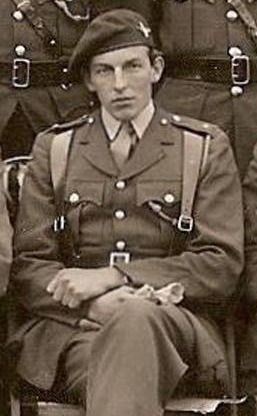
A Company were dropped away from the target of Arnhem Bridge and had to go through Arnhem where the streets were blocked by German forces. Digby led his men through the back gardens of nearby houses instead of attempting to advance through the streets and thus avoided the Germans. Digby and A Company managed to travel 8 miles in 7 hours while also taking prisoner 150 German soldiers including members of the SS. During the battle, Digby wore his maroon beret instead of a helmet and waved his umbrella while walking about the defences despite heavy mortar fire. When the Germans started using tanks to cross the bridge, Digby led a bayonet charge against them wearing a bowler hat. He later disabled a German armoured car with his umbrella, incapacitating the driver by shoving the umbrella through the car's observational slit and poking the driver in the eye.
Digby then noticed the chaplain pinned down by enemy fire while trying to cross the street to get to injured soldiers. Digby got to him and said "Don't worry about the bullets, I've got an umbrella". He then escorted the chaplain across the street under his umbrella. When he returned to the front line, one of his fellow officers said about his umbrella that "that thing won't do you any good", to which Digby replied "Oh my goodness Pat, but what if it rains?" Digby was later injured by shrapnel, which also cut open the rear of his trousers but continued to fight until A Company had run out of ammunition. Despite the radios being unreliable as Digby had predicted and the bugle calls being used most in the battle, the message "out of ammo, God save The King" was radioed out before Digby was captured.
Because of his injury, Digby was sent to St Elizabeth's Hospital but escaped out of a window with his second in command Captain Tony Frank, when the German nurses had left them alone. After creating an escape compass from buttons on his uniform, Digby and Frank headed towards Mariendaal. Upon arriving, they were hidden by a Dutch woman who spoke no English before being put in contact with her neighbour. He disguised them as painters and moved them to Derk Wildeboer's house. Wildeboer was a local leader of the Dutch Resistance in Ede. They then met Menno de Nooy of the Dutch Resistance who gave them a bicycle. Wildeboer had a fake Dutch identity card made for Digby to allow him to pose as Peter Jensen, a deaf-mute son of a lawyer. Digby used the bicycle to visit fellow soldiers in hiding and the Germans did not recognise him despite him helping to push a Nazi staff car out of a ditch and German soldiers being billeted in the same house that he was staying in. Digby then gathered 150 escaped soldiers to head towards the front line. This was known as Operation Pegasus. Digby and the soldiers cycled to the Rhine and Digby flashed a V for Victory sign using Morse Code with his torch. Members of XXX Corps then ferried them across the river.
Upon return to the United Kingdom, Digby was awarded the Distinguished Service Order. He also wrote a report on the Battle of Arnhem Bridge that resulted in Lieutenant Jack Grayburn's posthumously receiving a promotion to captain and being awarded the Victoria Cross.
After leaving the army, Digby retired to his estates in Kenya, where he is credited with inventing the modern safari, where animals would be photographed rather than hunted.
A number of Digby’s siblings served in WWII, including his older sister Kit, who served with the Hadfield Spears Ambulance Unit. She narrowly escaped from France in 1940 and later served in the desert where she was awarded the Croix de Guerre for her gallantry in driving through machine gun fire to reach some wounded French soldiers.
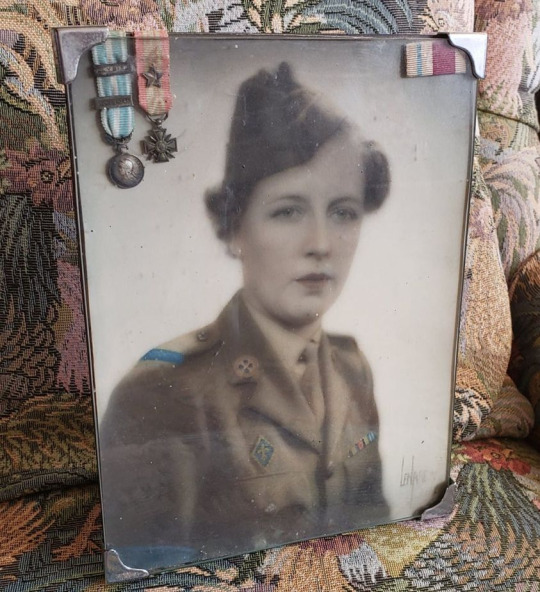
44 notes
·
View notes
Text
I was asked by @tairin to write about Murat’s personality.
This is going to be a bit long and in no particular order whatsoever.
Occasionally his personality seems like a jumble of contradictions. He never fell out of love with being a soldier, grew restless and bored during times of peace, always eager to be back in the field, but then, once there, hoping to get back home to his family as soon as possible and never having to leave them again. He became a king, and viewed his authority in Naples as absolute (or as absolute as it could be with Napoleon constantly breathing down his neck), yet he never fully shed the republican principles he eagerly adopted as a young man during the French Revolution. Bold, confident, and determined on the battlefield, he was often vacillating, indecisive, and unsure of himself in politics; yet in both circumstances he was also capable of extreme rashness, and his hasty judgments often led him to taking regrettable actions.
He was, like Napoleon, bursting with energy. He always had to be doing something. Upon taking the throne of Naples, he worked so tirelessly, day and night, trying to sort through the affairs of his predecessor and get his new kingdom in order, that for a time his wife Caroline was scarcely able to see him. This energy never dissipated, even into his forties; one English visitor to Naples in 1814 described him as "endowed with a large amount of pure animal vitality, which pleasureably expended itself in the active deeds of war, but found no sufficient vent in peace." (Cole, The Betrayers, 212)
Also like Napoleon, he could be very short-tempered; but unlike Napoleon, he never quite learned to contain his rages. When Napoleon threw one of his notorious temper tantrums complete with the hurling and stomping of his hat, it was generally done for show. On the other hand, I've come across multiple anecdotes of Murat, having to be physically restrained by either his staff or his ministers from attacking someone (one of these instances occurred during the 1812 campaign, when only the exertions of his chief of staff, General Belliard, prevented him from stalking out, armed, to the tent of Marshal Davout after the two had engaged in a bitter quarrel in front of Napoleon earlier). That being said, Murat's rages, like Napoleon's, were usually of short duration, often burning out within minutes. Caroline was well aware of her husband's temperament, and did her best to try to help him keep it in check; in one letter, she gently chides him to "calm a little your head, which gets hot so easily."
He was very opinionated, open, and frank--for better or worse. Some of his letters to Napoleon are honestly just breathtaking in their forthrightness; while as a general rule he bent to his brother-in-law's will (however begrudgingly), when provoked he was not afraid to express his discontent or disagreement with a brutal honesty which undoubtedly rankled Napoleon at times. Alone among the Bonaparte family, he spoke out vigorously against Napoleon's plan to take an Austrian bride as his second wife, and urged Napoleon to marry a Russian princess instead. When it became apparent that the decision had already been decided upon beforehand, he angrily accused Napoleon of setting him up with the intention of rendering the soon-to-be empress, and by extension the Austrian royal family, hostile to him. In short, he was far from being the groveler to Napoleon some have made him out to be.
He didn't handle high-stress situations particularly well. One theory I've read is that he suffered from psychosomatic illness, and I'm inclined to believe it. In Spain in 1808, when the people began to revolt and the situation rapidly spiraled out of his control, Murat fell ill--deathly ill, to the point where it was thought he might've been poisoned. His health experienced a similar collapse during the calamitous retreat from Russia in 1812, when he was placed in charge of the disintegrating Grande Armée. And a year prior to that, in the wake of an exceptionally bad quarrel with Napoleon over Neapolitan affairs, his mental state became so bad that Caroline kept his ministers away from him for days, and his overall health suffered throughout that summer.
His general demeanor was upbeat and happy, though I would argue that this was considerably less so during the last few years of his life. But he seems to have always at least tried to preserve a cheerful outward demeanor, and numerous memoirists have remarked on his happy nature.
He could be vain and boastful; he loved telling people about his exploits in war (and with women). He did make an effort to cultivate the manners of the nobility though, wanting to fit in as well as possible after his meteoric rise into the upper echelons of society. But he seems to have gone a bit overboard with it all. Hortense de Beauharnais writes in her memoirs that
He sought to have good manners and overdid them. One saw by his exaggerated dress and his attentions to the ladies that he wished to resemble the Villarceaux and Sévignés of the days of Louis XIV. These famous courtiers were the models he had chosen, but the rough hearty republican could not be completely hidden, and the mixture of the two opposite types of character would have been ridiculous at times if one had not been conscious of the honest, frank soldier in the background who reconciled the puppets one to the other. (The Memoirs of Queen Hortense, Vol. 2)
A less charitable contemporary, the Countess Potocka, whom Murat tried and failed to seduce in 1807, writes of her first encounter with him:
It was easily seen that his manners were sham, and that he usually had others. He did not talk badly, for he watched himself carefully; but his Gascon accent and some too soldierlike phrases belied the “prince” a little. He was fond of telling of his feats of arms, and talked war to us for over an hour. (Memoirs of the Countess Potocka)
He was, as even Napoleon described him, generous and kindhearted. When he became a king, he was so eager to bestow his Order of the Two Sicilies on anyone and everyone, that Caroline chided him that he must stop doing so, as it was becoming a joke in Paris. General Pépé writes of Murat's generosity in granting the petitions of the common people, describing one instance in which Murat was thrown from his horse while in the middle of receiving a petition from a woman begging for the life of her husband; after getting back to his feet and "cursing roundly in the French fashion," Murat promptly signed the petition to spare the life of the man. However, Pépé also points out that Murat's generosity and compassion occasionally worked against his own interests:
People of all classes, and even officers in the army, were in the habit of presenting themselves to the King, as he passed through the streets, with a petition in one hand and an ink-stand in the other. The good King Joachim granted those requests with too much facility, not considering that far from increasing his popularity by such conduct, he drew upon himself feelings of hatred, since the petitions so granted were for the part such as ought not to have been entertained. His too easy compliance, therefore, was calculated to awaken discontent and distrust of the efficiency of the laws. (Memoirs of General Pépé, Vol I)
He was also extremely prone to flattery (this ties into his earlier-mentioned vanity), and apt to reward and promote those of his generals who succeeded at ingratiating themselves with him but who may not have been the best commanders in the field.
He was very independent and chafed at being under the command of someone else. This was the case for the entire duration of his military career: he was discharged from his initial enlistment for apparently participating (and possibly leading) a "mutiny" against some officers; his stint in the National Guard was brief, and he wrote to condemn the officers over him for being "royalists;" in the 21st Chasseurs à Cheval, he quickly found himself at odds with his commanding officer, Landrieux, which devolved into an ugly affair with Murat going on trial before the Committee of Public Safety; he would likewise chafe under the commands of Brune and Berthier in Italy, and, for almost the rest of his life, he would chafe under the domination of Napoleon. Especially after being made a king, which he seems to have naively believed would grant him some amount of independence from the Emperor; in reality he merely became one of Napoleon's satellites, and became increasingly embittered by it.
He could be very politically naive (see 1814 and his belief that he could keep his throne by separating himself from Napoleon). He could also be extremely paranoid. His correspondence is replete with references to "my enemies." With the exceptions of Josephine and Savary, I've never come across the names of this mysterious cabal of enemies Murat believed to be actively undermining him and turning Napoleon against him in Paris while he ruled in Naples. His paranoia occasionally extended to his wife, whom he accused at least once of being in league with his enemies--this was in a letter written during another time when Murat was under extreme stress, during his failing Sicilian campaign. In 1815, his paranoia led him to abandoning his new allies, who he believed were on the brink of turning against him; so it can be argued that this aspect of his personality, combined with his hastiness, played a large part in his final ruin. (In the wake of Napoleon's escape from Elba, the English and Austrians both, out of desperation, hurried to send Murat guarantees for his throne if he would stay true to the alliance; but they arrived too late.)
He was extremely flirtatious, loved dancing and the company of women in general, sexual or otherwise. (See here for my post on Murat and women.)
He was a doting father, obsessed with his children; and an affectionate, if not always faithful, husband.
I'm probably forgetting some stuff, but I'll leave off here. Hopefully this provides a pretty good overall understanding of Murat's personality. Feel free to toss me some asks if there's anything you'd like me to expand on, I'm always happy to talk about Murat. :)
50 notes
·
View notes
Text
properly introducing my main fanservants!!!
LOTS OF PHOTOS/ART AND SUCH UNDER THE CUT BUT LIKE,,,, THIS IS JUST. A QUICK INTRODUCTION. TO MY PRIMARY SERVANT BASTARD CHILDREN- (in order of appearance; Sebastian Moran, John Watson, Enola Holmes, Columbia, Thomas Edison (True), Nicolas Flamel, Captain Stormalong, Edgar Allan Poe)
Feel free to hop in my ask box if you wanna talk about them or have any questions!!! Thank you for reading ily-
Colonel Sebastian Moran (Assassin)
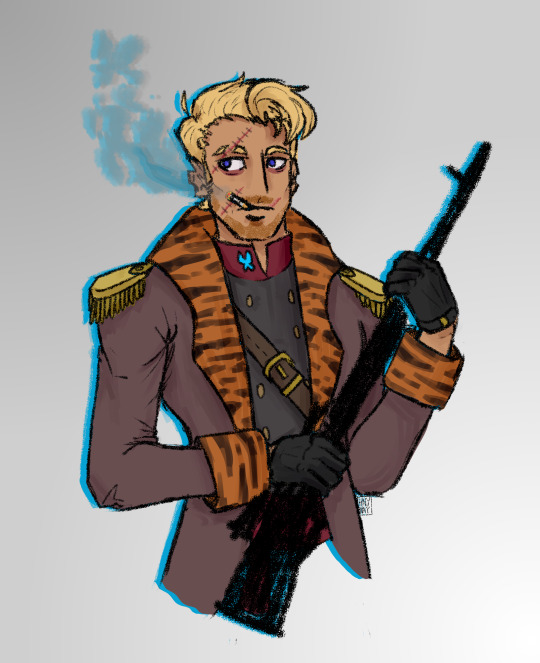
My primary servant OC by far! Professor James Moriarty’s chief-of-staff and right hand man- the second most dangerous man in London, after the Napoleon of Crime himself. Nicknamed ‘Basher’ or ‘Tiger Jack’, among others..
Moran is- or was- the most skilled marksman in the British Army, before he was dishonorably discharged. There are only a handful of men on the face of the continent able to shoot as well as he. As well as being an unnaturally skilled shot, he is a devoted sportsman and big-game hunter, and has notoriously tangled with tigers by himself in India- a predator that rather aptly describes the man himself. He authored two books, and his feats are still legendary in India, where his record 'bag of tigers' still goes unmatched. Although his outwards appearance was that of a respectable London gentleman and honorable military veteran, he gained a reputation in the evil underworld and was recruited by James Moriarty, serving as his 'chief of staff' of his criminal empire as well as his personal assassin for jobs that required his peculiar skill with a rifle.
The man is, as one Chaldean staff member puts it, a 'stone-cold badass'. He has a nerve of iron, and is vehemently loyal to both Professor Moriarty and his Master. He lives for danger, and the thrill that comes with 'kill or be killed' situations. Moran is also extremely easy and obvious to read- smiling 'like an idiot' when happy, and 'frowning like thunder' when angry. He does rather enjoy killing people, and is overall a man of few morals (although still having more than the Professor)- which, paired together, is what led to his leave from the military as he's practically a walking example of the 'Colonel Kilgore' trope. The more challenging the kill, the more enjoyment he gets out of it. As a strange upside, Moran has no illusions of how he's a right bastard.
"Ask anyone who knew me in the army, and you'll hear the same things about Basher: tiger in the field, bounder in the mess; a good man to have your back, but a bad man to show your back to; trust him with a fight, but not your sister, your wallet, or a deck of cards."
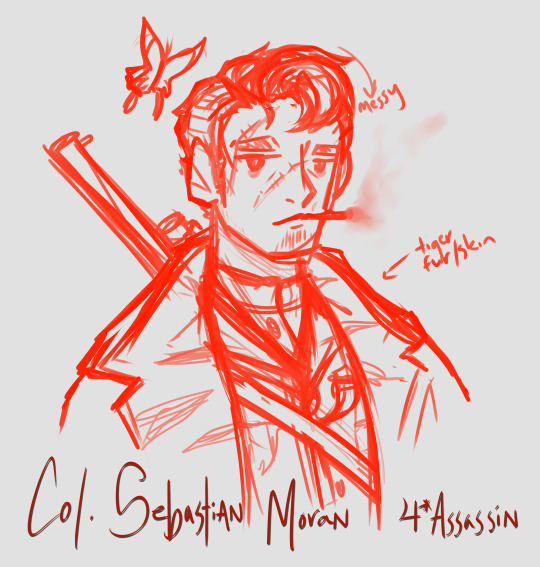
His Noble Phantasm, which represents his unmatched skill with a rifle, is called BEBR DER KHANH KHALI - Persian for ‘the tiger in the empty house’.
The bullet shot is, unlike others, a specially-made expanding revolver bullet which makes Moran unable to be likely linked to the kill. Much like a ghost or a tiger stalking its prey, he is completely silent in his attack, and the target can never see him coming before they're already dead- and just as quickly he is gone, seemingly disappearing into thin air without a trace.
No matter the conditions or distance, as long as Moran can see his target in some way- whether by the naked eye or through his scope, or perhaps in some other manner- his shot is guaranteed to hit its mark with deadly accuracy.
Also, if you find him not wearing his coat, it’s probably because he gave it to Jack. He loves knife child. They deserve proper clothes.
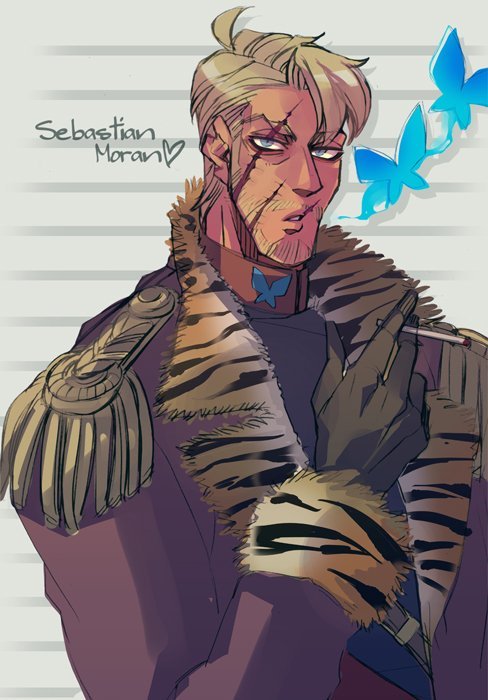
(source: amon-sheep on twitter)
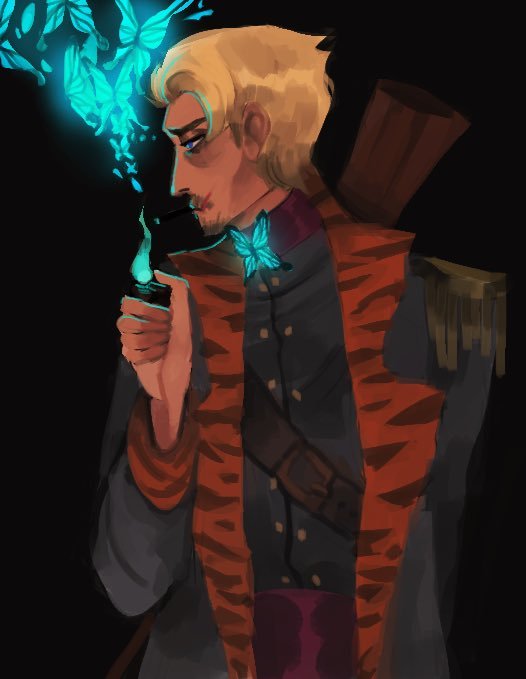
(source: manalmmune on twitter)
[[LINK TO HIS CHAPTER IN MY FANSERVANT FIC]]
--
Doctor John Watson (Caster)

The famed Boswell and best friend of the great detective himself. Aman who is most like his traditional origin, as opposed to the heavyset comedic figure modern media tends to make him out to be- aka the Watson that is described by Doyle as a former rugby player, an army man, and popular among the fairer sex due to his handsomeness, intelligence, and charm.
He quickly becomes a proper ‘fatherly’ figure in Chaldea and especially to Master, due to his big dad energies, despite never having the chance to be a father in his life. Chaldea also appreciates finally having a proper doctor that isn’t a Berserker or... whatever’s going on with Ascelpius. Watson is Holmes’s life compass, the loyal companion always by his side who balances the detective out.
Although he’s a caster, he also wields his trusty wartime revolver, and is curious in that, unlike most casters, he has one offensive Noble Phantasm- it’s his secondary, and his primary ‘Conductor of Light’ crystallizes Watson's role as a 'whetstone' for Sherlock Holmes's mind and unmatched stimulator of his famous flatmate's genius. As Holmes himself summarizes, “It may be that you are not yourself luminous, but that you are a conductor of light. Some people without possessing genius have a remarkable power of stimulating it.” This Noble Phantasm is purely supportive, serving to bring out the absolute best in an ally- whether it be manifested in power, magic, or inspiration- and temporarily unlocking a vast wealth of potential that they might not have even known they had. The exact limitations or bounds of it is not known, as it can seemingly extend in purpose as far as Watson or his Master might need it to in a given situation- able to provide buffs, grant moments of unmatched mental clarity or courage, and even unlock hidden abilities and Noble Phantasms if the moment is dire enough. His secondary NP is one he rarely uses, and hates to do so, because of the bad memories it dredges up- called ‘The Reichenbach Solution’, it creates a reality marble recreation of Reichenbach, with the roaring waters and a single shot from Watson himself sending the enemy tumbling off the falls to their demise.
Watson was old friends with Moran in the army, and reconnect during their time in Chaldea (despite Holmes and Moriarty’s protests), and he also joins the ‘author squad’ and spends much time with them. He is a rational man and sturdy as they come, always there when needed; whether it be to patch up wounds, help solve mysteries, or to help Master deal with all the mental trauma from their adventures (because holy shit they need HELP-). Also Also he probably just straight up adopts Mash, he and Holmes are her new gay dads.


(source: gomooink on twitter)
--
Enola Holmes (Ruler)
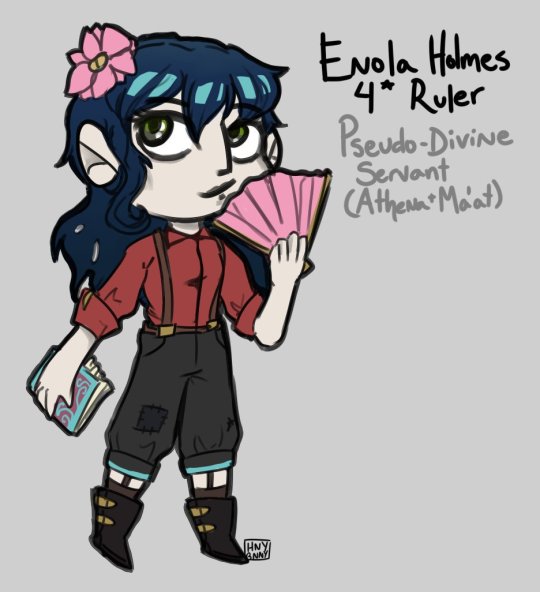
If Sherlock is the representation of all great detectives, then the teenage Enola Holmes is the representation of all female sleuths. Originally far too weak to be a servant- her source material being extremely modern (Enola Holmes series by Nancy Springer), she contains the essence of the great detectives of the fairer sex, but most importantly of two Divine spirits- Athena and Persephone (not Ma’at, despite what the image says-), both Greek goddesses. Athena is the dominant of the two, and a maternal figure to Enola, while Persephone is content just to sit back and enjoy the ride.
The younger sister of Sherlock and Mycroft Holmes (and sometimes, the mysterious elder sibling Sherrinford), Enola is much like her more famous brother- similar in lanky stature and physical features, including the prominent hawk-like nose. She is plain in appearance but behind bright eyes hides an intelligent, clever mind, albeit a stubborn and hard-headed one. She is a rebel at heart, resisting the efforts of society to shove her into the mold of a perfect subservient Victorian woman. Enola often uses being underestimated due to her sex and age to her advantage, and, like Sherlock, is quite adept at the art of disguise. With her Spirit Origin also containing figures like Nancy Drew and Miss Marple, Enola is a talented private investigator with a knack for seeing things from angles that other’s can’t- like that of a woman.
Also yeah, she gay. Keep scrolling. She would like to hold hands with Mash very much.


(enola w/ her brother mycroft; source, dewa-chan)
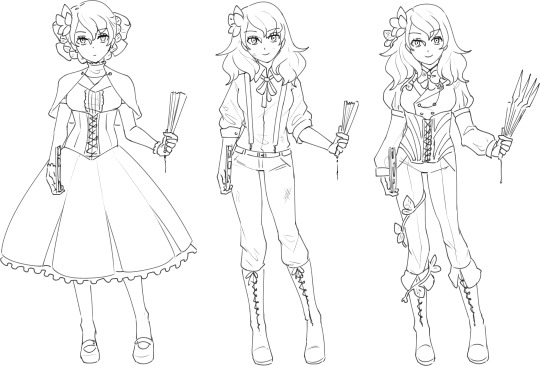
(concepts for her ascensions, mostly cemented, again courtesy of dewa-chan who i owe my life to always and forever-)
--
Columbia (Ruler)
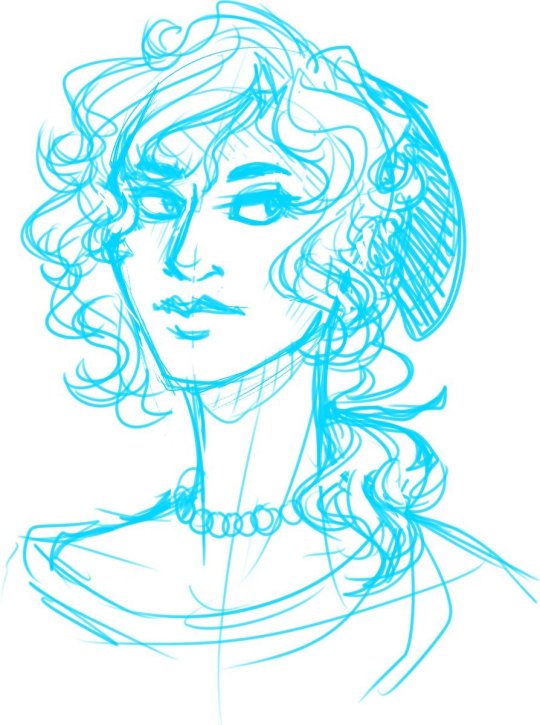
The Divine Servant calling herself Columbia is a complex individual. At face value, she is the personification of the United States of America, often visualized as a goddess; a quasi-mythical figure first written about by the enslaved poet Phillis Wheatley during the Revolutionary War in her work To His Excellency, George Washington. Columbia is, in fact, an amalgamation of two lesser Divine Spirits. One of them is the Roman goddess of liberty, Libertas. The majority of personifications of liberty are merely aspects and appearances of her, including the Statue of Liberty and the unidentified woman in the painting Liberty Leading the People, leading to Libertas having a more powerful- if rather confusing- Spirit Origin compared to most other minor Roman deities. The other is Columbia herself; a goddess first encountered by Chaldea during the odd adventures with Paul Bunyan. She is the symbol of America, and although she is technically a goddess, she is not worshiped- instead existing as an anthropomorphic personification akin to Uncle Sam. She is a goddess crafted by humankind, a manifestation of the thirst for freedom and equality that resides in the heart of man.
However, her existence is still closely intertwined with Libertas, having come from her 'lineage'; Columbia explains that if other personifications of liberty were to manifest, such as Marianne- the French icon of liberty, they would have to have Libertas accompanying their own Spirit Origin to be anything more than a Phantom. Columbia is not only linked to the nation carrying the name America, but to the land itself- in her earliest incarnations she served as a representation of the Americas- both South and North- to those across the Atlantic. She protects all who walk across the great frontier, and all those who have walked it before. Geronimo often voices his hopes that she is the same goddess that brought the first peoples of the yet-unnamed land delicious maize in abundance; Columbia only ever gives a knowing wink, always keeping the answer to herself.
Columbia tries to speak like a newscaster- that is, without an accent- to hide that fact that her true accent as a Servant is the thickest fucking New York brogue you can imagine. AYYYY, SHE’S WALKIN’ ‘EEEEERE!!!!
She has two Noble Phantasms- a support one, her main, called ‘ TORCH OF THE NEW COLOSSUS: THE DREAM OF A NATION ‘, and an offensive albeit rarely used NP called ‘ STRIKE FOR FREEDOM: DO NOT WEEP, FOR WAR IS KIND ‘ that has anti-Country parameters /because it straight up fuckin’ manifests the american military from all across its history-/
Columbia is just... a big country mom. who can grow to the size of the statue of liberty. whoops.
[[LINK TO HER INTRO CHAPTER IN MY FANSERVANT FIC]]
--
Thomas Edison (True) (Caster(?))
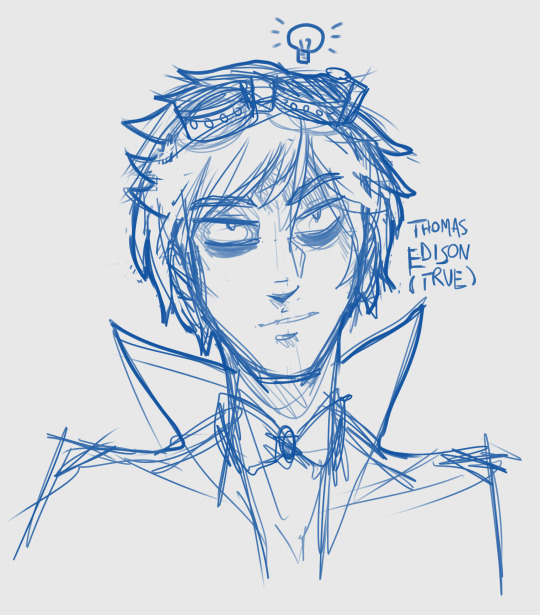
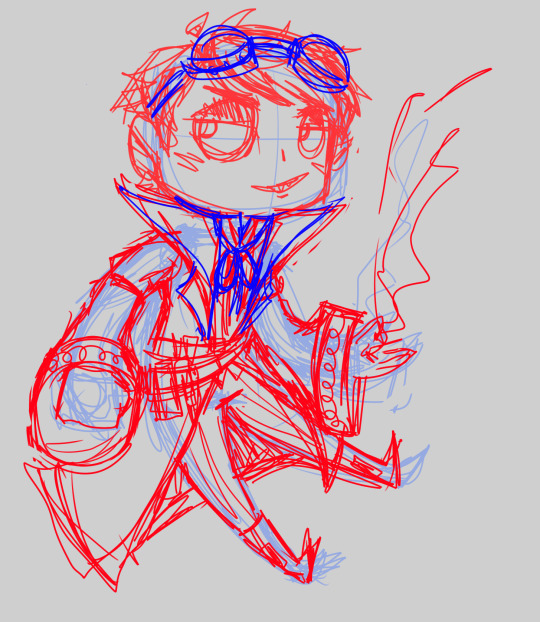
BASTARD MAN. BASTARD. This Thomas Edison, though being initially called an Alter, is actually the True manifestation of the ‘Wizard of Menlo Park’ without the influence of so many presidential heroic spirits. To match Tesla, he’s a 5*. I have him as Caster but... that’s still up in the air, tbh.
He will steal your Noble Phantasm and claim it as his own. It’s actually one of his Skills- ‘Intellectual Copyright’. It blocks an enemy's ability to use their Noble Phantasm, sealing it for a length of time, while also buffing Edison in return- the strength of the buff received is proportionate to the strength of the sealed Noble Phantasm. This embodies Edison's habit of taking other people's ideas for his own, and while he often improved upon them, he still claimed them as solely his creations. He can copy the abilities of others and shape them to his own needs, always at the ready with a lawsuit in hand if anyone dare complain!
He is not allowed around Ivan or Ganesha due to his history with elephants and electrocution.
His Noble Phantasm (he may have more than one, he gets VERY shifty when asked) is a manifestation of his most terrible and deadly creation- the electric chair. He can also create a reality marble of a fantastical Menlo Park, a thriving center of innovation and invention, using his Territory Creation.
Did I mention he’s a bastard? God, he’s a bastard. He’s incredibly intelligent BUT HE IS A BASTARD. He’s Evil alignment (arguably, may be Chaotic Netural-). It pains Tesla to admit that he actually likes normal Edison (furry man) much more.
Ask him what he did to Louie Le Prince and he’ll sock you in the jaw and take off running (and also not answer).
--
Nicolas Flamel (Caster)

The Alchemist, the great and immortal Nicolas Flamel himself. He’s a sad old lanky Frenchman DILF dad who misses his wife a lot, and is always ready to throw hands with Merlin and/or Paracelsus. He’s a potential candidate for the Grand Caster class, but is behind Solomon and Merlin in ‘line’. Flamel was a successful French scribe who would gain a reputation as an alchemist after his death in 1418- or at least, his presumed death. He was rumored to have been successful in his creation of the Philosopher's Stone, an artifact with the ability to transmute base metals, and with it was able to create a way to achieve immortality. This Stone was his magnum opus, and he was the first to successfully create it- a fact he makes sure that Paracelsus is aware of at all times.
Also, much like Merlin, he’s not a true Servant. This is THE Nicolas Flamel. But... what happened to Perenelle, his wife? He does not like to talk about it.
He enjoys peace and quiet, educated debate, and reading. Flamel gets on quite well with his fellow Frenchman Dantes, as well as with Waver/El Meloi.
THE DRAGONS OF FLAMEL (Skill): Flamel summons a staff of Cadeceus. Carried by the Greek god Hermes in mythology, it is said "...wake the sleeping and send the awake to sleep. If applied to the dying, their death was gentle; if applied to the dead, they returned to life". In the hands of Flamel, it can stun an enemy or counteract the effects of a stun-inducing skill upon an ally. As well as that, it can channel the effects of its corresponding god-named element mercury, able to dissolve many metals like silver and gold at will. However, like mercury, this skill is extremely volatile and prone to backfiring violently on Flamel if overused.
ELIXER OF LIFE (Skill): The ultimate alchemical creation- the solution, part of Flamel's legend, that granted he and his wife immortality. He keeps a small flask of the elixer on him at all times, and can be used in a pinch to heal all of Flamel's physical wounds, or that of a singular ally. However, it is not enough to grant an ally immortality, nor is it enough to heal multiple mortal wounds. The substance takes exactly one week, given the right materials, for Flamel to remake and refill his flask with some of the elixer.
He has two Noble Phantasms, one being ‘The Stone of the Philosphers’, and the other being ‘The Book of Abra-Melin the Mage’.
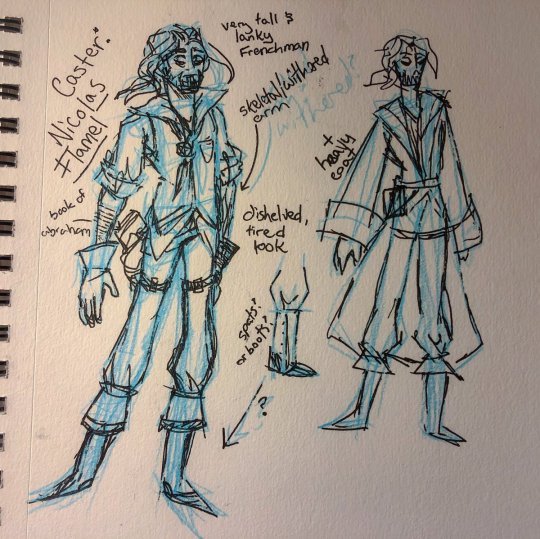
[[LINK TO HIS INTRO CHAPTER IN MY FANSERVANT FIC ALSO THERES A LATER CHAPTER WHERE HE ATTEMPTS TO THROW HANDS W/ PARACELSUS]]
--
Captain Alfred Bulltop Stormalong (Rider)
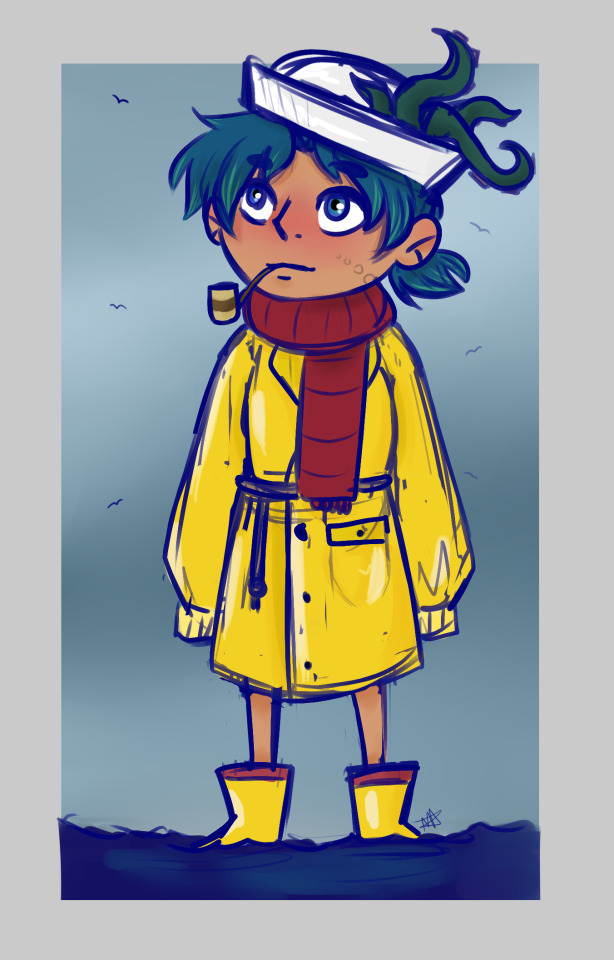
Captain Alfred Bulltop Stormalong is, plainly put, pretty much a nautical version of Paul Bunyan. Like Bunyan, he can change his size at will, growing to huge proportions. His giant ship was said to have hinged masts so as not to catch them on the moon, and had a stable of Arabian horses on board for his crew to get from one end of the ship to the other! Stormalong is said to have had a lifelong rivalry with the fabled Kraken- but unfortunately for the legendary sea beast, it got summoned alongside Stormalong and has begrudgingly taken up residence in his hat in a somewhat smaller form.

His main weapon (not drawn) is a ship's anchor he wields like a flail. His pipe is really just for the aesthetic as he can't use it to smoke, but it does blow bubbles! His Noble Phantasm is The Courser and the Kraken (Massive all-enemy damage + stun).
He’s a good boy who loves boats, the water, and clam chowder.
--
Edgar Allan Poe (Foreigner)
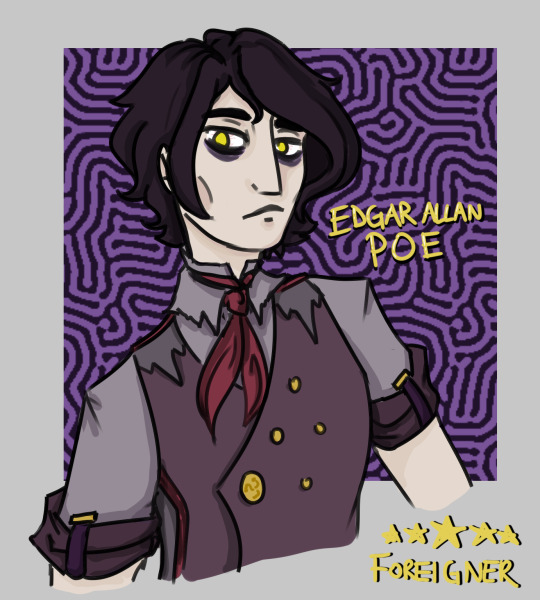
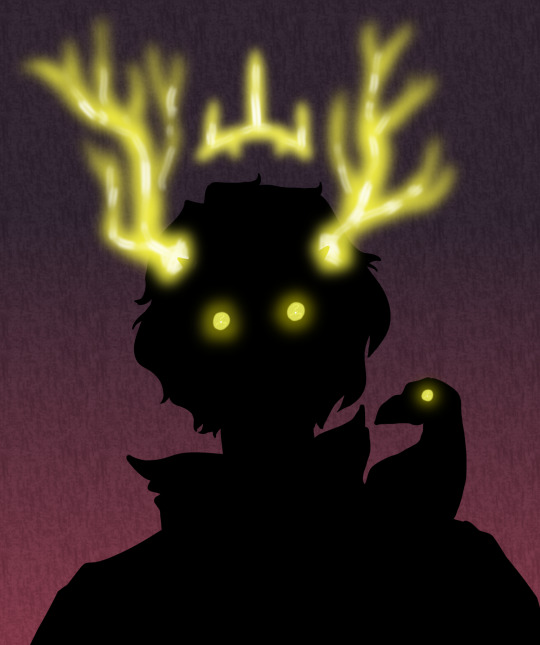
The alcoholic author himself, Edgar Allan Poe is a Foreigner-class servant, being linked with the King in Yellow- Hastur the Unspeakable.
Sometimes you can find him locked in a tiny pitch-black closet with Dantes and Sherlock, all three of them puffing away in utter silence on their tobacco. Hastur most often takes the form of a multi-eyed raven chillin’ on his shoulder, and is capable of speech- if prodded, he will shit-talk the patrons of Poe’s fellow foreigners. He really doesn’t like Cthulhu and Yog, even if Poe has psuedo-adopted Abby, WHOOPS. Hastur, to his credit, is the least malevolent Elder God/patron in Chaldea- though if he is seen chatting with Moriarty by any servants or staff, Master must be alerted immediately.
True to form, he’s very macabre, with a unique dramatic way of speaking much like his writings. He’s unsettling and creepy, but has impeccable manners and likes to chat (he’s very lonely-). He enjoys a good mystery, and is prepared to find Arthur Conan Doyle if he be a heroic spirit and beating the snot out of him for treating Holmes so poorly- Poe was the inventor of the detective fiction genre, after all. Most of skills manifest visually as references to his most famous works. His NP is ‘ A DREAM WITHIN A DREAM : THE CRY OF THE YELLOW RAVEN, NEVERMORE ‘
He doesn’t know what a ‘Hot Topic’ is, but it sounds intriguing!
And no, he doesn’t know what the hell was up with his death either. Weird shit happens in Boston.
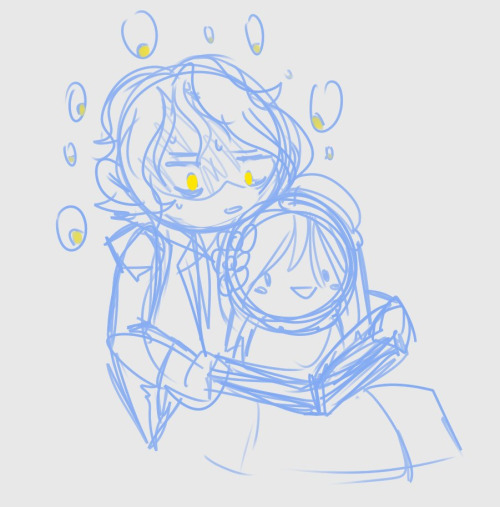

#sebastian moran | assassin#john watson | caster#fgo oc#fanservant#fate grand order oc#enola holmes | ruler#captain stormalong | rider#nicolas flamel | caster#columbia | ruler#thomas edison | caster (true)#edgar allan poe | foreigner#servant#fate grand order
71 notes
·
View notes
Photo
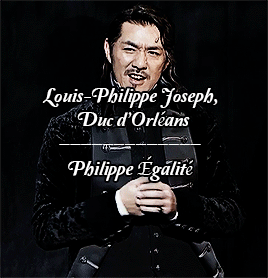
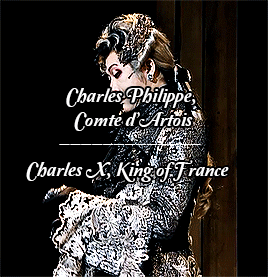





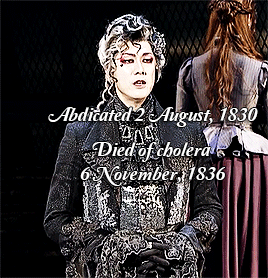
Gif Request Meme - A Musical of my Choice + a Villain: Artois and Orléans
↳ Requested by @fallenidol-453
Philippe Égalité: The only legitimate son of the Duc d’Orléans, a prince du sang from birth, Philippe was a very unlikely revolutionary. And yet Philippe showed a strong level of compassion for the lives of the lower class, going down a coal shaft to see the conditions faced by miners, pulling a groom of his from a river with his own hands, and providing shelter for the poor during the bitter winter of 1788-89.
He was noted for his extravagant lifestyle; a noted lover of racehorses, gambling, architecture, his various and assorted mistresses, and all things English. Despite being the richest man in France, with a truly astronomical income, he nonetheless found himself frequently in debt. That was the impetus for him to totally redesign the Palais Royal over the course of two and a half years, opening it up to shopkeepers and establishing it as a major area for counter revolutionary activity, with the police being banned from intervening. As such, an overwhelming feeling of liberty prevailed there, with people from all social classes gathering to observe the spectacles and walk along the gardens there.
There was a certain amount of hostility to be expected between the two branches of the Bourbon family, going as far back as the first Duc’s tempestuous relationship with his brother, Louis XIV. Still, the relationship between Louis XVI and Philippe gradually deteriorated over time, despite several attempts to patch things up. Orléans blamed Louis for the loss of his naval career, with the controversial Battle of Ushant in 1778 being a major breaking point in their relationship. In 1788, he spoke up at a “Royal Sitting” where Louis tried to press the Parliament into obeying his will, saying “Sire, this appears to be illegal.” Louis responded, “It is legal, because I wish it to be so.” Orléans spent the next five months in a comfortable exile at his estate, and he returned more popular than ever.
When the Estates General was called, Orléans sided with the Third Estate, taking his place with the other delegates rather than sitting with the Royal Family as his rank entitled him to. His name was consistently brought up alongside revolutionary activity, with his bust being paraded alongside Necker’s on July 12, 1789, when the rash charge of the Prince de Lambesc into the Tuilleries heightened the people’s fears over an armed crackdown of Paris. It would be in the Palais Royal where Camille Desmoulins would jump on a table and call the people to arms, and even though the exact impact of that statement’s been disputed, the fact that Palais Royal was a huge locus point for revolutionary activity never has been.
Among the royalists, it was popularly thought that Orléans was behind the entire Revolution, masterminding the Storming of the Bastille, the Women’s March to Versailles, a famine, and various and assorted other disturbances, in lieu of believing that the common people themselves were discontent. However, the sources nearest and dearest to Philippe suggest that he had no intention of seizing power, and Philippe’s own action of going and staying in England at Lafayette’s suggestion between October 1789 and July 1790, when he had a strong chance of fighting back against the charges and seizing power for himself by riding off the highest point of his popularity, strongly indicates that he had no intention of seizing the throne for himself. Overall, while he was a man of undeniable courage, the popular consensus is that he was, by nature, too passive to do it on his own, generally being very diffident to those near him such as his former mistress and longtime friend, Madame de Genlis, as well as her rival for his attention, Pierre Ambroise François Choderlos de Laclos, and generally disinterested in long-form plans, preferring to throw himself into whims. It is far more likely that, if a plan existed to make Philippe king, it came from one of those brains, as opposed to anything Philippe himself considered in any detail.
He did, however, become embittered over the increasingly chilly reception he received at Versailles, including one occasion where a courtier shouted “Do not let him touch the wine!” when he entered, with him then being spat on as he made his leave.
In the latter half of 1792, Philippe faced a bevy of problems, both personal and political, as his long-suffering wife had filed for a separation, his daughter was put on a list of émigrés and was forced to leave the country very shortly after arriving (after Madame de Genlis, who he had instructed to take her back before her name could be added, lingered for too long, causing a final breakdown in their long relationship), his popularity was rapidly fading, and he had been called, as a Deputy of the National Convention, to sit at the trial of his cousin. According to one anecdote, found in William Cooke Taylor’s Memoirs of the House of Orléans, it was in that particular maelstrom that he changed his name, as a last ditch effort to save his daughter and prove his loyalty to the Revolution, to Philippe Égalité. Many options were considered for him to not sit the trial, and there is no reason to believe, despite the long-lasting enmity that the two of them had, that Philippe, when he went to sleep the night before the trial of Louis began on December 26, that he had any idea that when it came time to give the verdict on January 14-15, he would vote “yea,” a decision that shocked the entire room, not the least Louis himself. Perhaps it was a last ditch effort to save himself, perhaps he felt pressured to do it by everyone else in the room, perhaps in that moment he truly believed that Louis’ actions merited the death penalty. It’s impossible to truly know, but in the end that one decision, more than anything else, has defined his legacy.
However, the Royalists would soon be able to find some comfort, as, on the 4th of April 1793, his son, Louis-Philippe, Duc de Chartres, defected along with General Dumouriez, and Philippe’s enemies had the ammunition they needed.
On 7 April, 1793, he was arrested and sent to Fort Saint-Jean in Marseilles, along with two of his sons. Throughout his imprisonment, Philippe kept up an optimistic front, constantly reassuring his sons, the Duc de Montpensier and the Comte de Beaujolais, on the rare occasions he was allowed to speak to them after they were separated, that everything would turn out well, even expressing optimism about his trial in Paris. Whether this was real or simply an attempt at keeping up morale will never be known, but on November 2, 1793, he was sent back to Paris, to be imprisoned in the Conciergerie. He was tried on the 6th and, at his own request not to prolong things any longer than necessary, he was executed on that same day. By all accounts, he met his death courageously, his composure only threatening to break when the cart he was in stopped in front of the Palais Royal, so that he could very clearly see the sign on it that said it was now national property. His last words were to stop the assistants at the guillotine from taking off his boots, saying “You are losing time, you can take them off at a greater leisure when I am dead.”
Unlike his royal cousins, his body was never found, and to this day, he is generally considered as one of the great villains of the Revolution in media associated with it, though none of the serious charges against him (the October Days being prime) were ever proven.
Charles X- For most of his younger years, like his older cousin, Charles’ defining quality was his wild life, which was punctuated by multiple love affairs, copious gambling and alcohol, and even more copious debts, with his brother, Louis XVI, somewhat reluctantly paying the bills. He also had a close friendship with his brother’s wife, who he shared a love of high living with, the two of them often being seen together at the theatre and balls. This close friendship was much remarked upon, with Artois being a frequent subject of the pornographic pamphlets that circulated about the queen, along with Marie Antoinette’s favorite, Madame de Polignac. In the years preceding and following the Revolution, however, the two of them gradually cooled, with their later relationship being marked by political disagreements. Charles consistently pressured his brother into more conservative stances during the meeting of the Estates General, arguing against doubling the Third Estates’ representation and conspiring to get rid of Louis’ liberal finance minister, Jacques Necker. The dismissal of the Necker would end up being one of the leading causes for the Storming of the Bastille, with Charles’ temporary personal victory being quickly eclipsed by the blaze that the little spark of Revolution had turned into. In the days immediately following the Storming of the Bastille, Artois was ordered to emigrate by his brother, along with the rest of his family.
He wouldn’t see France again for decades, going from court to court in Europe asking for help and trailed by a small army of creditors (who would become some of his most frequent companions, the avid huntsman only being able to go out riding at his estate at Holyrood on Sundays, when his creditors would be unable to pursue him), but with very little materializing, even less of which was successful, with the Battle of Quiberon being particularly disastrous to any hope of a royalist win by military might. Instead, he set up his main residence in London, with his mistress, Louise de Polastron, sister-in-law of Madame de Polignac, upon whose death he swore a vow of celibacy, the former playboy becoming sober and religious in his later years. The family briefly returned to France in May 1814, with the exile of Napoleon to Elba, however his later escape and mustering of the troops led to them leaving the city in February 1815, only able to fully establish themselves back in the country shortly after Napoleon’s defeat at Waterloo. Upon his brother, the Comte de Provence’s ascension to the throne as Louis XVIII (the space between XVI and XVIII being taken up by Charles’ young nephew, Louis-Charles, who died in prison and therefore never ruled), Charles became known as a leading member of the Ultra Royalist faction, who were, as the name suggests, “More Royalist than the king.” His brother dying without a male heir, Charles took the throne in 1824, though his highly conservative policies following his more tolerant brother’s reign made him highly unpopular with the public.
In 1830, he was forced to abdicate. His intent had been for the throne to go to his young grandson, however, it would go to Louis-Philippe, Duc d’Orléans, the son of Philippe Égalite (who would himself end up being deposed.) He spent the remainder of his life similarly to how he spent his exile, traveling from place to place, hounded by debtors.
Eventually, he would die in Austria, on 6 November 1836, 43 years to the day of his revolutionary cousin’s execution.
Sources:
The Chevalier de Saint-Georges: Virtuoso of the Sword and the Bow: Gabriel Banat
A French King at Holyrood: Alexander John Mackenzie Stuart
The Journalists and the July Revolution in France: The Role of the Political Press in the Overthrow of the Bourbon Restoration 1827–1830: Daniel Rader
Memoirs of the House of Orléans: William Cooke Taylor
The Perilous Crown: France Between Revolutions, 1814-1848: Munro Price
Prince of the blood : being an account of the illustrious birth, the strange life and the horrible death of Louis-Philippe Joseph, fifth duke of Orleans, better remembered as Philippe Egalite: Evart Seelye Scudder
Revolutions in the Western World 1775–1825: Jeremy Black, ed.
#perioddramaedit#asiantheatrenet#musicaltheatreedit#historyedit#1789 les amants de la bastille#marie antoinette das musical#keigo yoshino#mitsuo yoshihara#long post#ch: artois#Production: Toho#other musicals: MA#historical#on this day in history we mourn the death of two thots#one more than the other#(apologies if I smudged any facts given that it is rather late)
69 notes
·
View notes
Photo
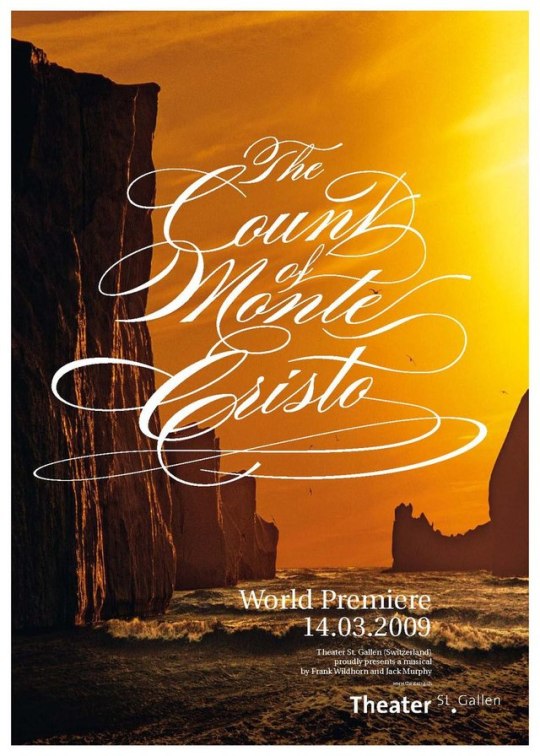
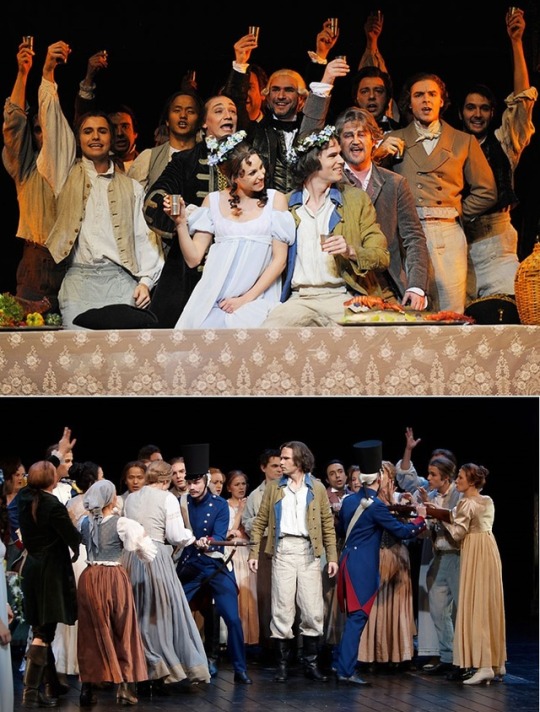

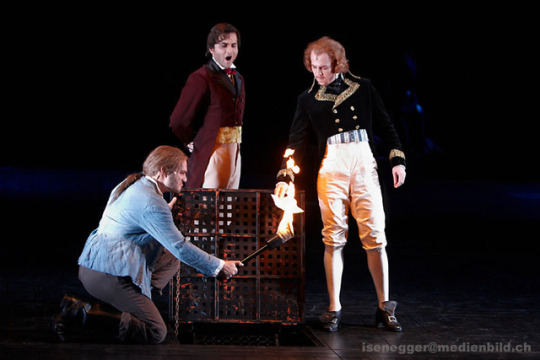
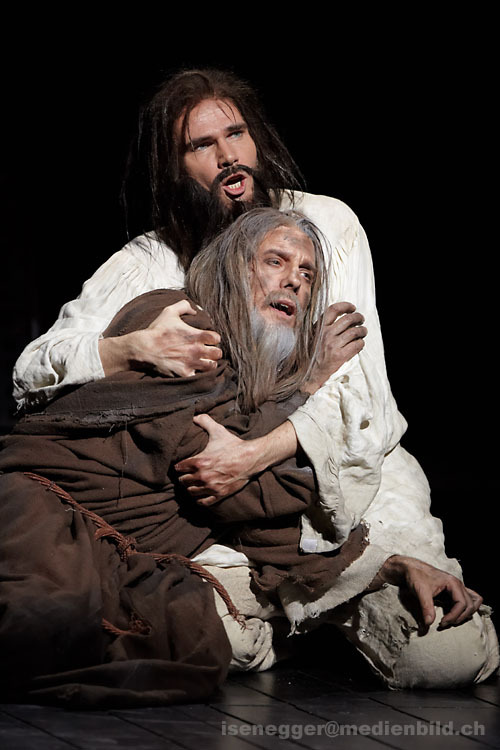


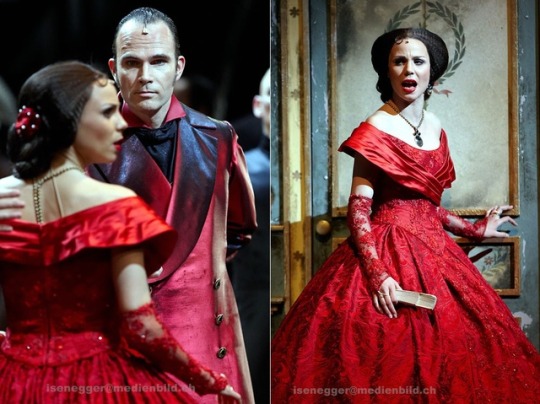
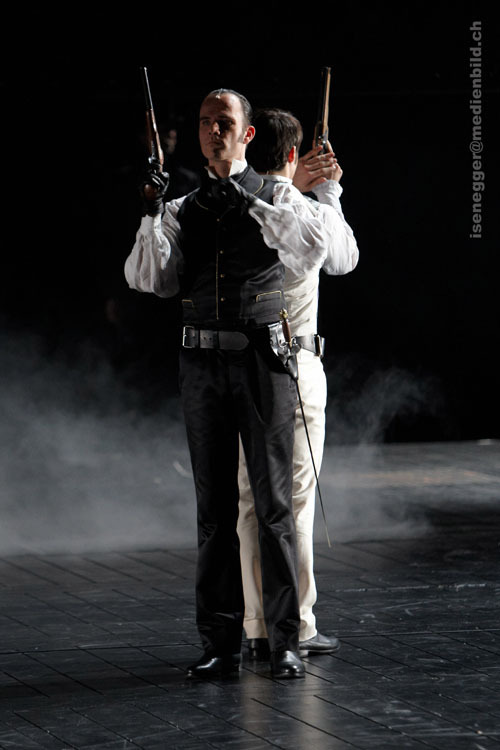
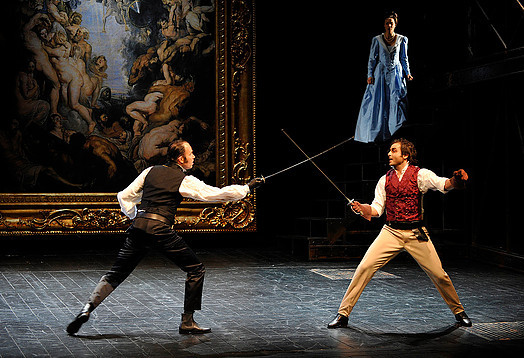
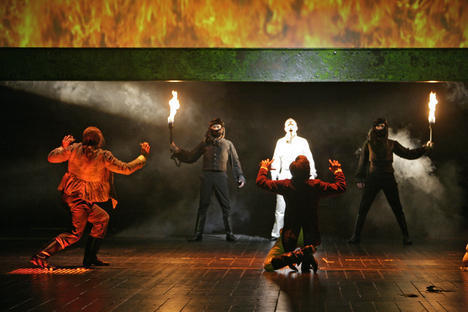
Happy 10th anniversary!!
The same day of exactly ten years ago, on march 14th 2009, the Theatre St.Gallen (Switzerland) hosted the world premiere (in german language) of “The Count of Monte Cristo” (within the title of «Der Graf von Monte-Christo»), musical adaptation of Alexandre Dumas père’s novel of the same name. From classic french literature to the theatrical stages, written by the composer Frank Wildhorn with lyrics and libretto by Jack Murphy.
Congratulations to all the creative team that was behind this production (with the great direction of Andreas Gergen, Simon Eichenberger as dance captain, Susanne Hubrich’s gorgeous costume designs and the fight director Jochen Schmidtke), its authors and the marvellous cast of talented actors and voices, for reaching this goal. I wish you all and for your careers the best life could offer, as the happiest and fulfilling moments.
For whoever desires to watch the original first performance, here is available the german musical provided of english subtitles. enjoy!
I want to use this corner to wholly and properly thank the entire cast members, for how passion they bring along their characters on stage, with amazing acting and strong vibrant voices. in order:

• Thomas Borchert in the main role starring as Edmond Dantès/the count of Monte Cristo. His talent rendered well the man’s journey from a simple naïve young sailor to a merciless messenger of revenge, for after coming back once again and reunite to his old self, to be free, not just “physically” (from the condition of imprisonment of the Castle d’If), now even “heartly” and soul-ly, from the obsession and destruction that the slavery of vengeance thoughts was devouring him to the core. • Sophie Berner in the role of Mercédès Herrera, the sunshine beautiful fiancée of Edmond and afterwards the bride of Mondego. For all the grace yet strength in endure all the pain and sorrow for all those years, the protection and affection of a loving mother towards her child, ready to relinquish and suffer anything for him, to be finally rewarded with happiness at the end. • Carsten Lepper, Christoph Goetten and Karim Khawatmi (in the next picture) as Fernand Mondego (love rival for Mercédès’ heart), Gérard de Villefort (chief prosecutor of Paris, keeper of connections towards Napoleon Bonaparte – at that piece of History foe of the French’s royal family and King Louis, so every supporter would be punished for treason against the crown – due to his father’s politic ideals, he will find himself in a tough decision that tests his intentions of true justice, between to not struck down an innocent’s life ‘cause of a dangerous letter Edmond owns from his dying captain and was ready to send – despite unaware of its content, that involves Villefort’s family and can potentially ruin them under the society’s eyes, or sacrifice to not lose everything he built up until that moment and maintain the secret, safe and untold) and Danglars (Pharaon’s bookkeeper and later Paris’ influential banker), the plotting trio against Dantès and the Count’s enemies.

• Dean Welterien as Abbé Faria, old priest prisoner at the Chateau d’If, Edmond’s mentor and guide through the period of prison and loneliness. The most reasonable also morally righteous character of the entire story and you can’t beat that. • Kurt Schrepter as Jacopo, former pirate and the Count’s faithful right arm, his most trusted and closest friend after Edmond’s new freedom and escape, selfless and helpful, for his own initiative he decided to follow the former prisoner, after their knife duel on Vampa’s ship, and help him with his plan. • Daniel Berini as Albèrt Mondego, young and kind man of Parisian noble class, son of Mercédès and Fernand. He will come across the Count’s path in Rome, during the colorful Italian Carnival, for an unexpected encounter, unaware if for fate’s decision or for human’s hand and work.

• Barbara Obermeier in the role of Valentine de Villefort, daughter of the chief prosecutor and betrothed to Albèrt. Through her actions, moved by true feelings and determination, she’ll remembrance to the Count the innocence and pureness of young love, awakening old memories of so long ago in his cold and hardened heart from hatred and thirst for revenge, leading the man to spare the boy’s life in real compassion and mercy, making him finding once more the – thought lost – kindness of these gentle sensations. • Ava Brennan as the brave and kick-ass Luisa Vampa, leader of a crew of Italian bandits and pirates that sail the seas. Strong and independent woman with her harem of lesbian piratesses, deal with the fact she’s the boss and ready to fight you just for fun’s sake. • André Bauer as Monsieur Morrel, owner of the Pharaon, the commercial ship in which Edmond worked in before his arrest, when near to be the ship’s new captain. • Suzanne Carey, part of the magnificent and wonderful ensemble, she performed in multiple minor roles during the entire performance, first as one of the unnamed guests in Edmond and Mercédès’ betrothal feast and after in the opulent ball organized by the Count in his new rich mansion, for his entrance in the Paris’ society, as an upper-class lady, wife of Villefort and mother of Valentine.

• Ines Hengl-Pirker [13], part too of the talented ensemble, she performed as Madame Danglars in the ball scene and, as well as Suzanne, a member of Vampa’s crew, as a proud piratesse. • Mathias Förster [15], highlighted the role of the dying former captain of the Pharaon, Leclère, and the caring old Louis Dantès, father of Edmond. ps. just for personal satisfaction fan content, here I leave a glorious picture of Luisa kick-asses Vampa, in her smoothest expression of amusement.
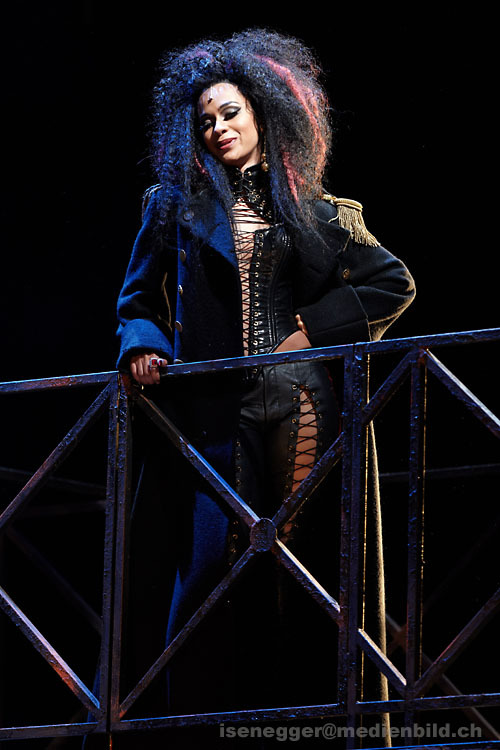
plus bonus cute happy edmond and mercédès during their betrothal party, providing of lovely flower crowns by Fernand (the karmic irony, isn’t it? also, why u re such asshole in this adaptation what happened to you where is lost the mondego of the book in love for his wife unthinkable of betraying her with others and caring with his son and proud of him??? explain wildhorn)
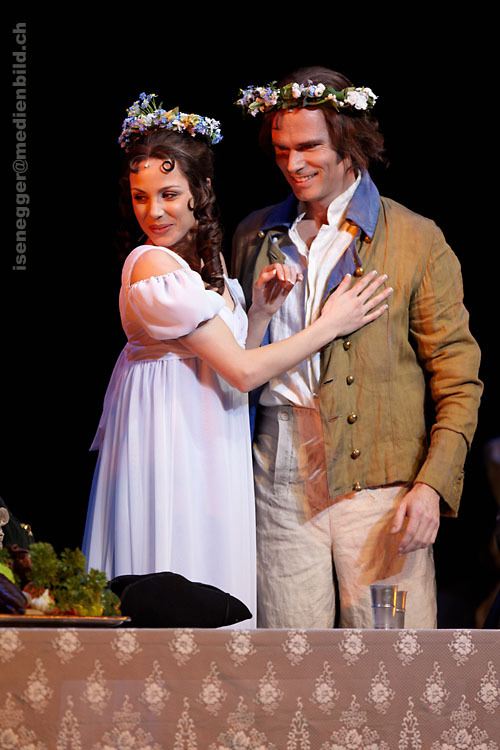
#the count of monte cristo#der graf von monte-christo#tcomc#tcomc musical#musical adaptation#alexandre dumas#alexandre dumas father#alexandre dumas père#classic french literature#2009 german premiere#theatre st. gallen#anniversary#frank wildhorn#jack murphy#thomas borchert#edmond dantès#sophie berner#mercédès herrera#mercédès mondego#carsten lepper#(my unmutable love)#fernand mondego#(my other unmutable love)#christoph goetten#gérard de villefort#karim khawatmi#danglars#kurt schrepfer
35 notes
·
View notes
Text
In Retrospect, Henry Clay and the Elections of 1824 and 1832
The American “Antebellum Era” is seldom spoken about. Sandwich between the revolutionary and civil war periods, the antebellum age is defined by various titans of the time. 1824 was when the first generation of America’s Goliath’s began to exit stage right into retirement. In the formative years of the republic the position of Secretary of State was seen by many as a stepping stone to the presidency. After all, future presidents Thomas Jefferson, James Madison and even the aforementioned James Monroe held the prestigious position before elevating to the Executive Mansion. Whomever Monroe selected to be his Secretary of State likely would succeed him in the presidency.
Henry Clay desperately wanted to be that man. So much so, he tried to dictate his own faith by crowning himself John Quincy Adams’ Secretary of State after making him president in after the hotly contested election of 1824 went to the House of Representatives, where he was House Speaker.
In any other previous election Clay would have been President. In 1824 Clay was young, vibrant, still riding off the fumes of his war hawking for conflict with Great Britain twelve-years earlier. Ironically, it was his nemesis Andrew Jackson ultra-successful campaign in New Orleans which shifted not only the tides of the war, but saved Clay’s career. By 1815 the British had enjoyed smashing success against the Americans after recently vanquishing the French Emperor Napoleon Bonaparte, the red coats no longer needed to fight off the pesky Americans with one hand tied behind their back.
Four months and thirteen days after Bonaparte’s abdication, in 1814 the British burnt America’s capital to the ground. Though the Americans outnumbered the British by more than three-thousand men, the U.S militia groups proved not on the same level as the expertly skilled British fighting force already experienced from fighting Napoleon and his various allies. The White House burned, as well as many other public buildings, followed by the brief occupation of the District of Columbia. If it weren’t for Mother Nature and her conjuring up sudden, heavy thunderstorms and throwing in a tornado for good measure, forcing the British back to their ships, the capital likely suffers the fate similar to Carthage at the hands of the Romans - except no salting of the Earth in the literal sense.
If such events occurred, it is safe to assume the war’s main proponent, Henry Clay, his political career would go up in smoke. Instead, the Battle of New Orleans gave the United States the leverage it needed for its diplomats to carve out a favorable peace, basically resulting in the status quo ante bellum. The British dream of reconquering their lost colonies extinguished and the United States would never again face a on-land invasion. The War of 1812 didn’t benefit anyone besides Andrew Jackson and Henry Clay. The two people who’d continuously duke it out for supremacy in the world of politics.
It is initially believed before the Civil Rights and Voting Rights Acts of the 1960s only white men could enjoy the privilege to vote. This is definitely true, but it is far too narrow of a description. You also must be rich and own land none of which easy to come by. This is how you get leaders who are not necessarily rockers of the boat into the White House under the perceived guise of anointment. Andrew Jackson represented the downtrodden poor and he saw himself as their champion.
1824 is the precursor to the election we just witnessed in 2016. A frustrated, vitriolic base in America feeling ignored find their man to pin all their hopes and identity on no matter what the facts are. Bypassing accomplished, skillful politicians along the way in favor of continuing the practice of scapegoating various minority groups.
Now, Henry Clay and those in his flock accomplished more than the establishment guards today could only dream. You can say many things about Clay, you cannot say he merely sat around and voted on bills that renamed post offices. Known as “The Great Compromiser” Clay saved the nation numerous times in 1820, 1833 and 1850 that did prolong the American Civil War and continue the practice of slavery. If you are to hold that last paragraph against Henry Clay I will not call you out on it. But at the various times it seemed war between the regions was unavoidable, the north and south were on even plains, the north becoming more industrial and advanced as time marched forward setting the stage for a war where the north held substantial advantages.
But the outcome of the American Civil War wasn’t a forgone conclusion. At many points the Confederates could have secured their independence. Clay successfully kept a ambivalent south obviously itching to succeed, from doing just that in times they likely would have won.
By 1824, Henry Clay started a war, ended one and saved the nation. At forty-seven Clay ran as one of the four Democratic-Republicans in the swan song election during the “Era of Good Feelings.” After the collapse of the Federalists, the Democratic-Republicans were the only viable political party in the U.S. The Federalists lived on in the Northeast, particularly New England in representative John Quincy Adams. A great man. An honorable, distinguished gentleman from Massachusetts whose unjustly forgotten in history. What did the Federalists in wholly was the Hartford convention in December of 1814, when the War of 1812 looked its most bleak for America. The convention called for removing the three-fifths compromise, which gave slave states disproportionate power in Congress and controversially flirted with New England seceding. When Jackson essentially won the war, the Federalists came off as unpatriotic to those outside of New England. This damned the already fledgling Federalists into their coffins.
Adams, son of second President John Adams, embodied the fictitious views we hold of the founding fathers today. Adams wasn’t a slave owner, fought against its expansion and later became a fervent abolitionist. Hamstrung by a congress becoming ever more friendly to his foe Jackson and lacking the skills someone like Henry Clay has, Adams’ presidency goes down rightfully as a failure and as merely a buffer between eras. Sort of like how no one can name the quarterback of the Miami Dolphins before Dan Mario and after Bob Griese. You’d be hard pressed to find people who know who David Woodley and Don Stock are. And you’d be equally taxed finding someone who gives two damns about John Quincy Adams.
Clay retired from his role as House Speaker, his term officially ending when the new congress is scheduled to have sworn in. His last act as House Speaker in 1825 is manipulating the House to bend to his whim and elevate Adams to the presidency after neither candidate in the 1824 election achieved the majority in the electoral college. Despite Jackson running away in both the electoral college (99) and popular vote (41.4%), it was Adams who’d be sworn in on March 4th, 1825. If Henry Clay won just three more electoral votes, enough to secure third-place from William H. Crawford of Georgia, “The Western Star” possibly is able to work his magic to select himself over both Adams and Jackson.
Arguably, the most damning political miscalculation during Clay’s first chapter in politics is not the “Corrupt Bargain,” but the naked ambition it failed to mask. If Clay simply not accepted Adams’ invitation to become Secretary of State, perhaps he’d become President feasibly in the near future.
So what-if Clay had become President in 1824? For starters, he’s more aggressive in pursuing his legislative goals than Adams. Like Barack Obama long after him, Adams fell under the delusion his political enemies were acting under good faith and not out of naked partisanship.
Clay dreamt of an American economy independent from the British through protective tariffs on foreign goods imported to the states. Part of this principal resides in Clay’s famed “American System.” It’s core tenets are:
• It’s main tenants are the establishment of a protective tariff, a 20%–25% tax on imported good.
• The establishment of a national bank would promote a single currency.
• The improvement of the country's infrastructure, especially transportation systems.
Much of this cannot be accomplished in four-years - especially with the Jacksonians wrestling more and more power away from people like Henry Clay. In two-years the newly formed Democrats takeover the House, Senate and the Executive Mansion by 1829.
Like Adams, a Clay presidency only is viewed in a better light by historians who admire their apparent foresight and compassion regarding the plights of native Americans and enslaved blacks, comparably when held up against expansionist slave owners like John C. Calhoun who referred to the institution of slavery as a “positive good.” While Clay acted as an unabashed war hawk in Congress in 1812, twelve-years have passed since then and he’s matured somewhat. Both Clay and Adams believed the Union was big enough as it was and foresaw the only way for the complete emancipation of slaves is through warfare.
Historian H.W Brands, author of the fantastic “Heir to the Founders” described the complex Clay as a slave-owning emancipator. As a slave owner himself southerners were more receptive to Clay’s rhetoric than Adams. Clay believed slavery to be evil, not just for the enslaved, but the slave owner and thought if given the chance the horrible institution would die the way it did in the north. The north did not have a fit of morality when they eventually abandoned slavery. Economically it became untenable. Such fate awaited the south.
The one flaw with this is logic is having to believe all the south wanted was to be left alone. In reality, the faction labeled “Slave Power” fought mightily to drag the north to not only accepting their wrong, but for them to join them in calling it right. When the Fugitive Slave laws passed and was signed by President Millard Fillmore, effectively making every norther complicate in the slave trade having to notify authorities if they suspected a black man to be an escaped slave, the Republic was firmly in the bloody grasp of the pro-slavey faction.
However, Henry Clay did not want to see the expansion of slavery and he didn’t want to see the expansion of the union, less they continue to open Pandora’s box again and again.
That all being said, imagine losing someone like Clay in the heated moments following Jackson’s elections. Numerous times before the Confederates firer on Fort Sumter, the Union nearly split itself in half. If Clay decided, after suffering defeat at the hands of Jackson in 1828, to retire can Daniel Webster, John Quincy Adams or anyone else hold a candle to how he handled the calamitous situation? Hardly. A Henry Clay presidency in 1825 likely leads to civil war between the regions and likely the loss of half a union.
Fast forward eight-years later, Jackson and his acolytes have firm control of the government. Jackson is running for re-election and during this time the following issues dominate the campaign:
• The expiring charter of the 2nd National Bank
• The Indian Removal Act
• The ongoing Nullification Crisis
The Democratic-Republicans splintered off, Jackson carrying the banner for the Democrats and Henry Clay running under the label “National Republican” made up remnants of the Federalists and Democratic-Republicans loyal to Adams and Clay.
Jackson despised the national bank because he believed it was directly funding Clay’s campaign. The American people perceived banks to be solely for the elite. Believing the national bank to be corrupt, Jackson set out to destroy it and by securing re-election the destruction of the bank was all but assured. The blame of the subsequent Panic of 1837 befell Jackson’s successor, Martin Van Buren, few realized it was his predecessor who laid the groundwork for the economic collapse.
Coming into the contest Clay had little chance of unseating the incumbent Jackson. Riding a wave of popularity, “Old Hickory” was viewed as one of the common folk while Clay a part of the political elite (because he was). Only way for Clay to pull victory from the jaws of defeat is if one of the following happens.
1. Andrew Jackson dies
2. Economic strife becomes prevalent sooner
3. Clay campaigns on his part in ending Nullification crisis and not stressing the importance of banking to an electorate which was at best apathetic on the matter.
Now the Nullification crisis was still ongoing during the election. South Carolinian John C. Calhoun renounced his role as vice-president to Jackson in favor of being elected senator to better oppose Jackson’s tariff bill. Ironically, Calhoun began his career as an ally to Henry Clay. South Carolinian politicians blamed the economic downtown of the 1820’s primarily on the tariff of 1812 which promoted American manufacturing heavily at the cost its European competition.
While Jackson and Calhoun nearly came to blows, Clay carved out a compromise which lifted the protectionist tariff until 1842.
If there ever was a time to fear monger about possible succession prior to the civil war, it was during the 1832 campaign.
So what if Henry Clay pulls off the monumental upset and unseats King Andrew I?
Well, for one, we see the president play a crucial legislative role in putting out the fires caused by Calhoun and Jackson. Back in the early 19th century, the presidency didn’t hold the powers it holds today. It mostly acted as a rubber stamp for congress, using their veto powers sparingly. Even the vicious King Andrew only used his executive powers to veto a bill he didn’t like twelve times in his eight-years in office. Times were different and the country was still finding itself.
Another plus for Clay and the nation is his election wipes away the travesty committed by the U.S government known as the “Trail of Tears” a series of forced relocations of Native American tribes west to make room for white settlers. The Supreme Court, headed up by Chief Justice John Marshall, said the Indian Removal Act was unconstitutional and the government had no right to do it. To put it bluntly, Jackson could have given less of a shit and relocated the native Americans anyway. Over 4,000 natives died on the trail.
The United States also averts the Panic of 1837 thanks in large part to Clay’s American System and the re-charter of the second national bank. Quite possibly, America missed out on one of their best presidents in Clay by not electing him in 1832 and saving themselves the worst of Jackson’s reign.
Course, the Democrats might’ve still held control of the House until 1840. The National Republicans/Whigs slowly ate away at their deficit culminating in them sweeping the House, Senate and Presidency with William Henry Harrison as their leader. How much Clay could have reasonably expected to accomplish is up for debate. What isn’t up for debate is the fact I believe Jackson did more harm to this country than good and like Trump, his greatest feat is his swindling of the American electorate to believe he emphasized and understood their plights. While Jackson can claim to have the best intentions, his disregard for the complexities of governance lead to much disruption and chaos.
The mystic of Andrew Jackson was just far too much to overcome for any mere mortal. It too five-years, the retirement of Jackson and an economic collapse that would not be rivaled until the Great Depression to shake the people out of Jackson’s trance.
6 notes
·
View notes
Text
Wishlist:
Hopping on this excellent bandwagon and posting my wishlist of plots, both canon and AU! Please let me know if you’d be interested in any of these or want a more detailed description of what I have in mind. Feel free to give your own input if you do want to do any of these! It’s a two-way street. :)

Canon: 1. The Other Man -- “Say No To This” This idea sprung from “Say No To This” from Hamilton, because, let’s face it, Solo’s no stranger to being the other man. If he’s received a few kickbacks to ensure he doesn’t go opening his mouth to the wrong person, so what? Everyone’s happy, no one is the wiser, no one gets hurt. But what happens when being the other man starts to hurt? When his affair starts to be what he most looks forward to?
2. 1945; The Young Thief Napoleon Solo joined the American army in 1945 at the tender age of sixteen, intent on escaping a lonely, neglectful home life and launching himself into the world beyond. He served as part of the cleanup forces that stayed behind in Europe once the war was done. It was during these few years that Napoleon got his start as a thief. With wide, startling blue eyes and breathless smiles he charmed his way through Europe.
3. UST This one speaks for itself. Unresolved sexual tension. That relationship he can’t pursue, won’t acknowledge, dances around. The name he murmurs in his sleep. Whether it be an enemy stationed always across the line from him or star crossed lovers, this is that relationship never quite boils over... until it does.
4. Jealous lover going to extreme lengths Napoleon’s a sucker for being wanted. This doesn’t guarantee he’ll want you back, but the chase is an act in which he luxuriates. The more complex it gets, the more desperate, the more breathless with excitement he becomes... so long as it’s your attention he wants.
5. Hurt/Comfort wound tending that builds to a deeper relationship As a spy, and as a spy with an eminently punchable face, Napoleon’s always nursing a few scrapes and bruises. And what’s better than some whump, really? Tending to wounds and patching each other up. Building a tender, trusting relationship in the peaceful silence of small safehouse bathrooms. Taking care of each other. Hurt, and then comfort. Also, and we’d have to chat about this, but the fallout from Gaby’s betrayal and Napoleon’s torture at Rudi’s hand.
AU: 1.“Babylon Berlin” Based heavily off the show Babylon Berlin. It’s 1929 and Napoleon Solo is an American spy undercover in Berlin, working as a detective for the Homicide squad while passing off information to his handler. Bonus points if you want to play a straight laced Vice squad detective, but definitely not required. Wild speakeasy parties, dancing, drugs, and booze, all couched in a art deco glamor.
2. Cursed New Orleans Vampire Otherwise known as the Interview With A Vampire AU. It’s 1800 and Napoleon, by fault of his own hubris and sass, has been cursed to never leave the borders of the city of New Orleans, and to live all his days in the dark, searching for company and a fresh meal, trapped as the world passes him by. OR same thing but in the 1920′s. Still in New Orleans.
3. Soulmates (flower and color marks) Everyone is born with the mark of a flower, the meaning of which is said to determine your fate. When you meet your soulmate the flower blooms with color, reflecting the circumstance of your meeting and the future of your relationship. OR your tattoo appears when you meet your soulmate, rather than being born with it.
4. Gatsby You know that cliche that the people are who always surrounded by people are the loneliest? Napoleon Solo, mysterious and debonair and independently wealthy, known for holding lavish parties he drifts through with a charming smile plastered on. But who’s the man really? What causes his heart to ache and those thousand mile stares across the lake?
5. Fight Club/Illegal boxing ring/bookie Napoleon, despite being extremely punchable, isn’t much of a fighter. He is, however, an excellent con man, and a bookie the mob trusts with their money. He takes the bets for an underground boxing ring. If you ask who he works for he’ll just smile and wink.
6. Circus (ringmaster/acrobat) Not exactly a Greatest Show AU. More along the lines of the Night Circus, set in a circus where everything is too good to be true and nothing happens by chance. I’d prefer for Napoleon to be part of the circus, though whether he’s the ringmaster or an acrobat/silk ropes performer I don’t mind, and he can be set opposite either a theatre-goer or a member of the troupe.
7. Golden Compass (daemons) Based off Philip Pullman’s His Dark Materials series. In this world your soul is a physical manifestation outside of your body, it’s own conscious being that takes the form of the animal most like the truth of your soul. When Sasha settled into her final form towards the end of his puberty Napoleon was surprised she hadn’t taken the familiar form of the magpie that had so often flown reconnaissance for him while he slipped in and out of galleries unnoticed.
8. Pacific Rim Napoleon is a jaeger pilot without a partner to drift with. He’s itching for action, with the need to move, but all previous attempts at drifting have ended in agony. He’s still beholden to the government in serving out his deferred prison term in service as a jaeger pilot.
9. Mutant Based off the MCU X-Men universe. Napoleon discovered his powers early, and took great delight in pushing and pulling at people’s attention, focusing them in on him at will before blurring himself out of their conscious attention. It was a difficult mutation to hide as well, much to his benefit when the purges began. As he trained his powers he became capable of drawing attention to his eyes, his smile, and away from his hands as they skimmed wallets and watches and rings from unsuspecting party-goers as he makes the circuits.
#Hello welcome to my ridiculous wishlist#Also none of these need to be historically accurate#It's all about that Fiction babey#Wishlist
2 notes
·
View notes